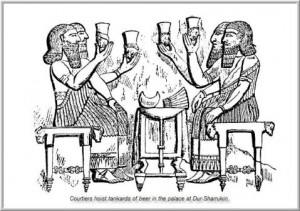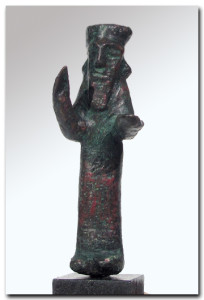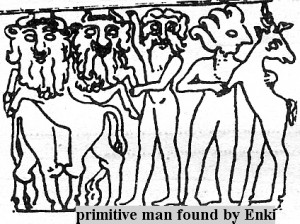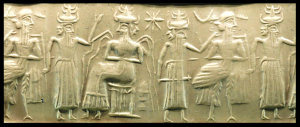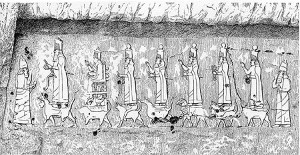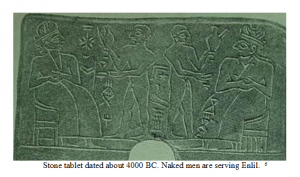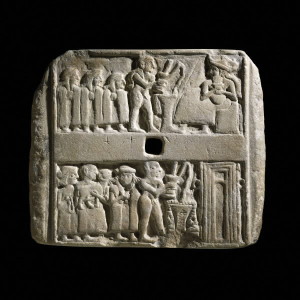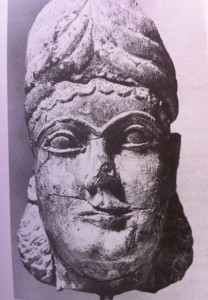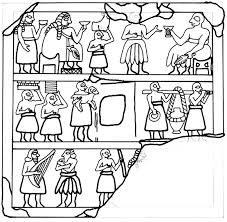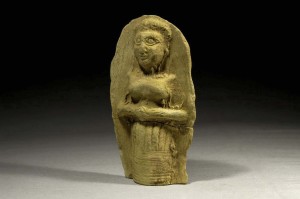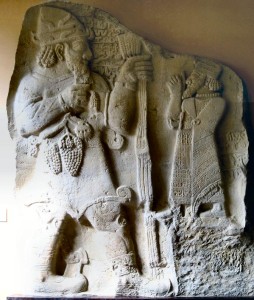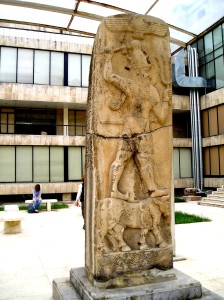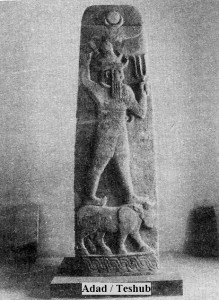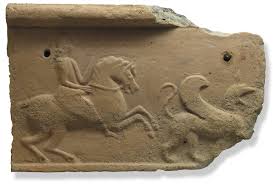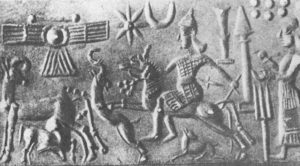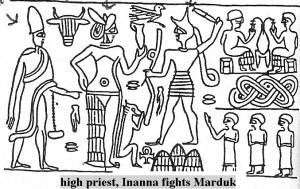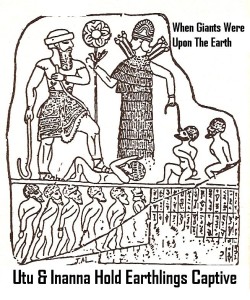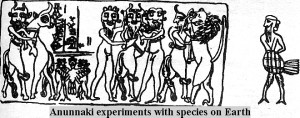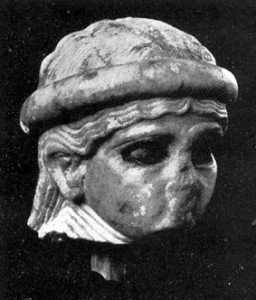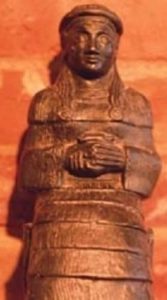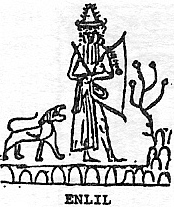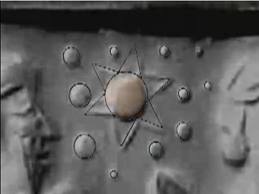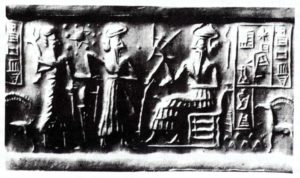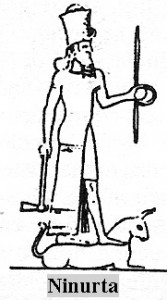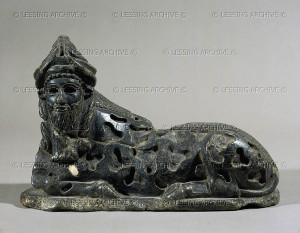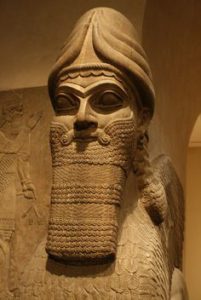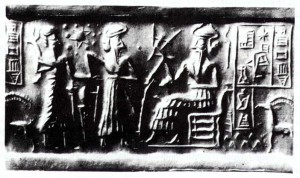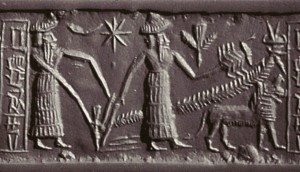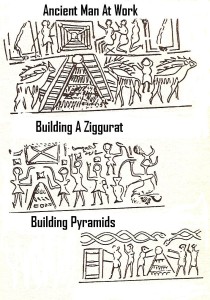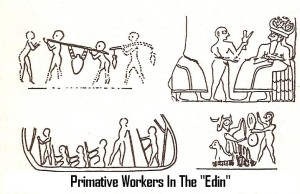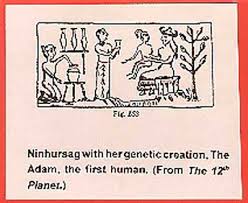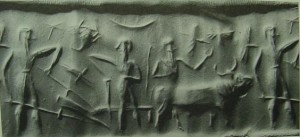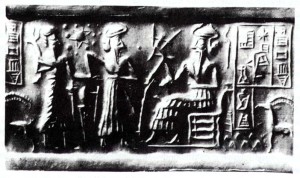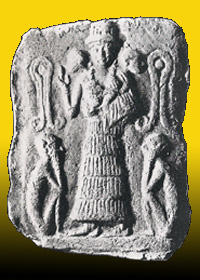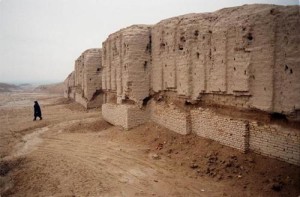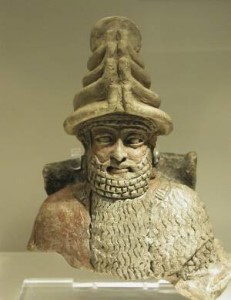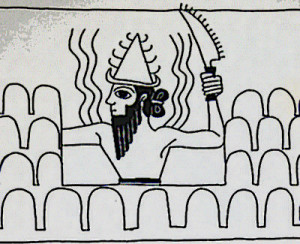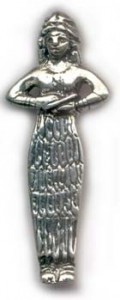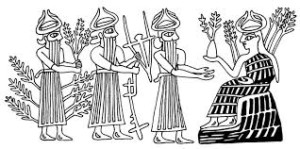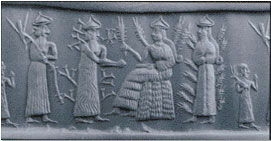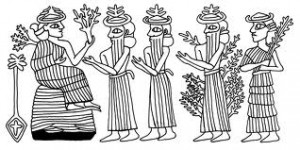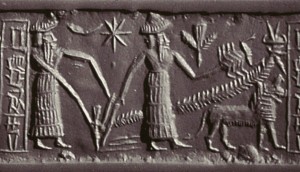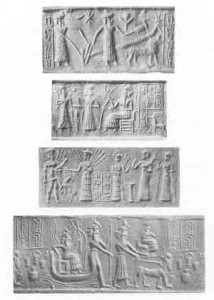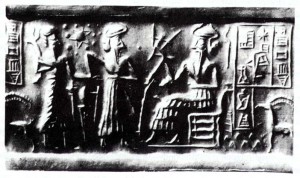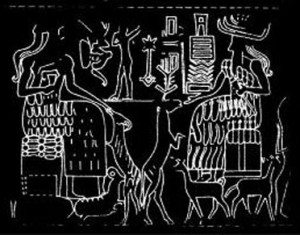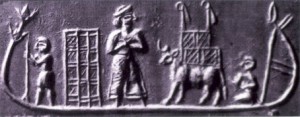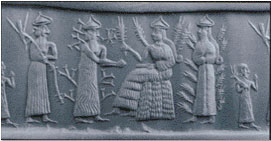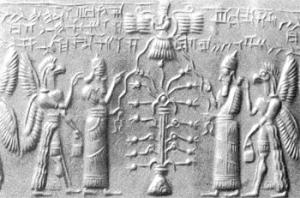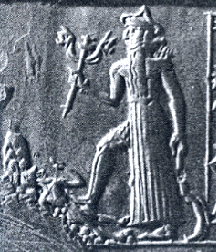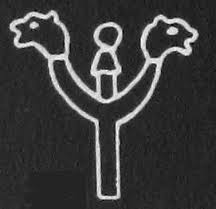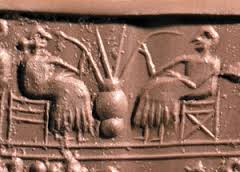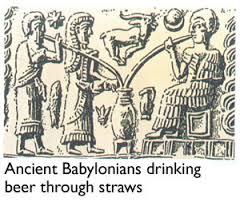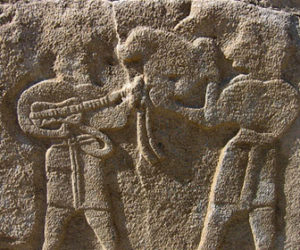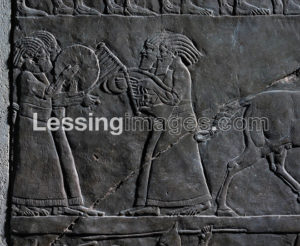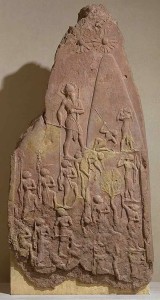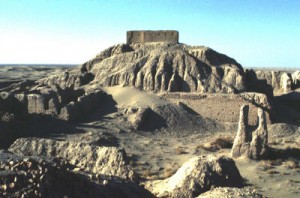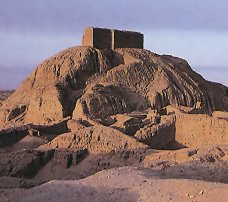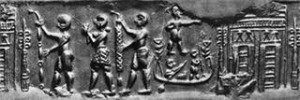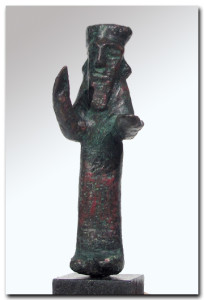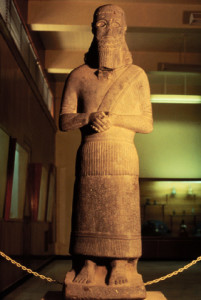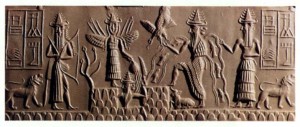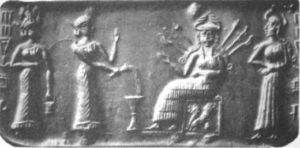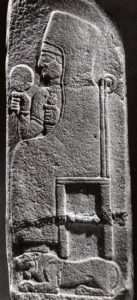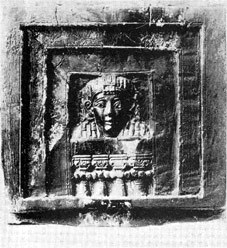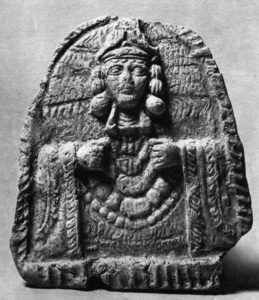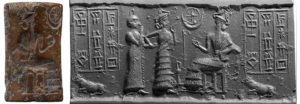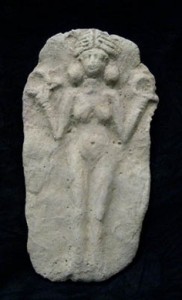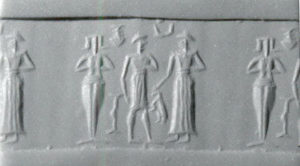|
from EarthHistory Website (Texts: All Artifacts, Color Coding, & Writings in Bold Type With Italics Inside Parenthesis, are Added by Editor R. Brown, not the Authors, Translators, or Publishers!)
The myth 53 involving Lahar, the cattle-god, and his sister Ashnan (Nisaba), the grain-goddess, represents another variation of the Cain–Abel motif in Near East mythology. Labar and Ashnan, according to our myth, were created in the creation chamber of the gods in order that the Annunnaki, the children and followers of the heaven-god An, might have food to eat and clothes to wear. But the Anunnaki were unable to make effective use of the products of these deities; it was to remedy this situation that man was created. All this is told in an introductory passage which, because of its significance for the Sumerian conception of the creation of man (replacement workers for the alien gods who “came down”). The passage following the introduction is another poetic gem; it describes the descent of Lahar and Ashnan (Nisaba) from heaven to earth and the cultural benefits which they bestow on mankind: In those days Enki says to (1/2 brother) Enlil: “Father Enlil, Lahar (unidentified goddess) and Ashnan (Nisaba), They who have been created in the Dulkug, Let us cause them to descend from the Dulkug.” At the pure word of Enki and Enlil, Lahar and Ashnan descended from the Dulkug. For Lahar they (Enlil and Enki) set up the sheepfold, Plants, herbs, and . . . they present to him;
For Ashnan (Nisaba, Enlil’s mother-in-law) they establish a house, Plow and yoke they present to her. Lahar standing in his sheepfold, A shepherd increasing the bounty of the sheepfold is he; Ashnan (Goddess of Grain) standing among the crops, A maid kindly and bountiful is she. Abundance of heaven . . . , Lahar and Ashnan caused to appear, In the assembly they brought abundance, In the land they brought the breath of life, The decrees of the god they direct, The contents of the warehouses they multiply, The storehouses they fill full. In the house of the poor, hugging the dust,Entering they bring abundance; The pair of them, wherever they stand, Bring heavy increase into the house; The place where they stand they sate, the place where they sit they supply, They made good the heart of An (Anu) and Enlil.” “But then Labar and Ashnan drank much wine and so they began to quarrel in the farms and fields. In the arguments which ensued, each deity extolled its achievements and belittled those of its opponent. (Enlil, 2nd son born, 1st of the “double seed”, Enki, eldest son to Anu, robbed of succession by Enlil) Finally Enlil and Enki intervened, but the end of the poem which contains their decision is still wanting.
|
Author Archives: nibirudb
The Debate Between Sheep and Grain: translation
The Electronic Text Corpus of Sumerian Literature
(Texts: All Artifacts, Color Coding, & Writings in Bold Type With Italics Inside Parenthesis, are Added by Editor R. Brown, not the Authors, Translators, or Publishers!)
(gods in blue)
1-11 When, upon the hill of heaven and earth,
An (Anu, King of planet Nibiru & Earth Colony) spawned the Anuna (alien giant Aninnaki) gods,
since he neither spawned nor created Grain (Nisaba) with them,
and since in the Land he neither fashioned the yarn of Uttu (the Goddess of Weaving)
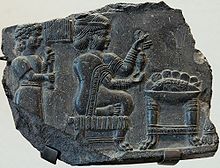 (Uttu, Enki‘s daughter, Goddess of Weaving)
(Uttu, Enki‘s daughter, Goddess of Weaving)
nor pegged out the loom for Uttu —
with no Sheep appearing, there were no numerous lambs,
and with no goats, there were no numerous kids, the sheep did not give birth to her twin lambs,
and the goat did not give birth to her triplet kids; the Anuna, the great gods,
did not even know the names Ezina–Kusu (Grain) or Sheep (unidentified goddess).
12-25 There was no muc grain of thirty days; there was no muc grain of forty days;
there was no muc grain of fifty days;
there was no small grain, grain from the mountains or grain from the holy habitations.
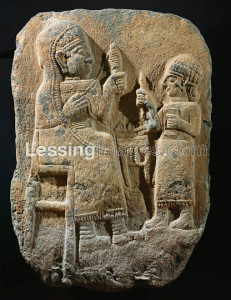 (Uttu & helper spinning yarn)
(Uttu & helper spinning yarn)
There was no cloth to wear; Uttu had not been born — no royal turban was worn;
lord Nijir-si (Ninurta), the precious lord, had not been born;
Cakkan (God of 4-legged Animals) had not gone out into the barren lands.
(earthling wild being found by Enki in the Abzu Enki with his DNA experiments attempting to fashion replacement workers)
The people of those days did not know about eating bread.
They did not know about wearing clothes; they went about with naked limbs in the Land.
Like sheep they ate grass with their mouths and drank water from the ditches.
26-36 At that time, at the place of the gods’ formation,
in their own home, on the Holy Mound, they created Sheep and Grain.
Having gathered them in the divine banqueting chamber,
(Anunnaki alien giants standing upon their symbols, zodiac symbols, etc.)
the Anuna gods of the Holy Mound partook of the bounty of Sheep and Grain but were not sated;
the Anuna gods of the Holy Mound partook of the sweet milk of their holy sheepfold but were not sated.
For their own well-being in the holy sheepfold, they gave them to mankind as sustenance.
37-42 At that time Enki spoke to Enlil: “Father Enlil,
now Sheep and Grain have been created (brought to Earth from Nibiru),
on the Holy Mound let us send them down from the Holy Mound.”
Enki and Enlil, having spoken their holy word, sent Sheep and Grain down from the Holy Mound.
43-53 Sheep being fenced in by her sheepfold, they gave her grass and herbs generously.
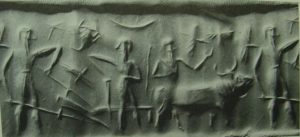 (early farming on Earth Colony)
(early farming on Earth Colony)
For Grain (Nisaba) they made her field and gave her the plow, yoke and team.
Sheep (unidentified goddess) standing in her sheepfold
was a shepherd of the sheepfolds brimming with charm.
Grain standing in her furrow was a beautiful girl radiating charm;
lifting her raised head up from the field she was suffused with the bounty of heaven.
Sheep and Grain had a radiant (female alien) appearance.
54-64 They brought wealth to the assembly.
They brought sustenance to the Land.
They fulfilled the ordinances of the gods.
They filled the store-rooms of the Land with stock.
The barns of the Land were heavy with them.
When they entered the homes of the poor who crouch in the dust they brought wealth.
Both of them, wherever they directed their steps, added to the riches of the household with their weight.
Where they stood, they were satisfying; where they settled, they were seemly.
They gladdened the heart of An and the heart of Enlil.
65-70 They drank sweet wine, they enjoyed sweet beer.
When they had drunk sweet wine and enjoyed sweet beer,
they started a quarrel concerning the arable fields, they began a debate in the dining hall.
71-82 Grain called out to Sheep: “Sister, I am your better; I take precedence over you.
I am the glory of the lights of the Land.
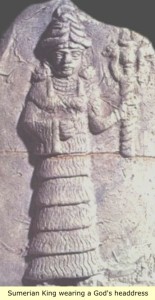
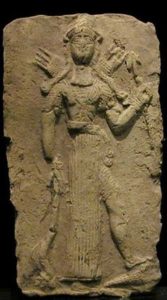 (Inanna, Goddess of Love & War)
(Inanna, Goddess of Love & War)
I grant my power to the sajursaj (a member of the cultic personnel of Inanna) —
he fills the palace with awe and people spread his fame to the borders of the Land.
I am the gift of the Anuna gods. I am central to all princes.
After I have conferred my power on the warrior,
when he goes to war he knows no fear, he knows no faltering (?) —
I make him leave …… as if to the playing field.
83-91 “I foster neighborliness and friendliness.
I sort out quarrels started between neighbors.
When I come upon a captive youth and give him his destiny,
he forgets his despondent heart and I release his fetters and shackles.
I am Ezina–Kusu (Grain) ; I am Enlil‘s daughter.
In sheep shacks and milking pens scattered on the high plain, what can you put against me?
Answer me what you can reply!”
92-101 Thereupon Sheep answered Grain: “My sister, whatever are you saying?
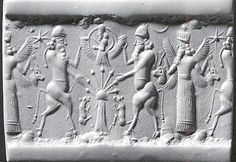 (An / Anu, King of planet Nibiru & Earth Colony, god the father in heaven)
(An / Anu, King of planet Nibiru & Earth Colony, god the father in heaven)
An, king of the gods, made me descend from the holy place, my most precious place.
All the yarns of Uttu, the splendor of kingship, belong to me.
Cakkan, (God of 4-legged Animals) king of the mountain,
embosses the king’s emblems and puts his implements in order.
He twists a giant rope against the great peaks of the rebel land.
He …… the slig, the quiver and the longbows.
102-106 “The watch over the elite troops is mine.
Sustenance of the workers in the field is mine: the waterskin of cool water and the sandals are mine.
Sweet oil, the fragrance of the gods, mixed (?) oil,
pressed oil, aromatic oil, cedar oil for offerings are mine.
107-115 “In the gown, my cloth of white wool, the king rejoices on his throne.
My body glistens on the flesh of the great gods.
After the purification priests, the incantation priests and the bathed priests
have dressed themselves in me for my holy lustration, I walk with them to my holy meal.
But your harrow, plowshare, binding and strap are tools that can be utterly destroyed.
What can you put against me? Answer me what you can reply!”
116-122 Again Grain addressed Sheep:
“When the beer dough has been carefully prepared in the oven, and the mash tended in the oven,
(Ninkasi, Enki‘s daughter, the very popular giant alien Goddess of Beer)
Ninkasi (Goddess of Beer) mixes them for me
while your big billy-goats and rams are dispatched for my banquets.
On their thick legs they are made to stand separate from my produce.
123-129 “Your shepherd on the high plain eyes my produce enviously;
when I am standing in the furrow in the field,
my farmer chases away your herdsman with his cudgel.
Even when they look out for you, from the open country to the hidden places,
your fears are not removed from you: fanged (?) snakes and bandits,
the creatures of the desert, want your life on the high plain.
130-142 “Every night your count is made and your tally-stick put into the ground,
so your herdsman can tell people how many ewes there are
and how many young lambs, and how many goats and how many young kids.
When gentle winds blow through the city and strong winds scatter, they build a milking pen for you;
but when gentle winds blow through the city and strong winds scatter,
(Adad / Ishkur, Enlil‘s son, giant alien God of Thunder & Storms, Adad upon his zodiac symbol Taurus the Bull)
I stand up as an equal to Ickur (Ishkur / Adad) (the god of storms) .
I am Grain, I am born for the warrior — I do not give up.
The churn, the vat on legs (?), the adornments of shepherding, make up your properties.
What can you put against me?
Answer me what you can reply!”
143-155 Again Sheep answered Grain:
“You, like holy Inanna of heaven, love horses.
(Inanna, alien Goddess of Love & War; earthlings no match for giant alien gods Utu & Inanna)
When a banished enemy, a slave from the mountains or a laborer
with a poor wife and small children comes, bound with his rope of one cubit,
to the threshing-floor or is taken away from (?) the threshing-floor,
when his cudgel pounds your face, pounds your mouth, as a pestle (?) …… your ears (?) …….
and you are …… around by the south wind and the north wind.
The mortar …….
As if it were pumice (?) it makes your body into flour.
156-168 “When you fill the trough the baker’s assistant mixes you
and throws you on the floor, and the baker’s girl flattens you out broadly.
You are put into the oven and you are taken out of the oven.
When you are put on the table I am before you — you are behind me.
Grain, heed yourself!
You too, just like me, are meant to be eaten.
At the inspection of your essence, why should it be I who come second?
Is the miller not evil? What can you put against me? Answer me what you can reply!”
169-179 Then Grain was hurt in her pride, and hastened for the verdict.
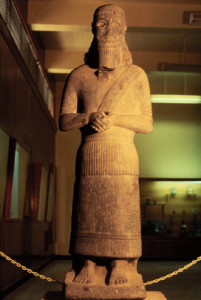 (Ishkur / Adad, these ancient artifacts are now shamefully destroyed by Radical Islam)
(Ishkur / Adad, these ancient artifacts are now shamefully destroyed by Radical Islam)
Grain answered Sheep: “As for you, Ickur is your master,
Cakkan your herdsman, and the dry land your bed.
Like fire beaten down (?) in houses and in fields,
like small flying birds chased from the door of a house,
you are turned into the lame and the weak of the Land.
Should I really bow my neck before you?
You are distributed into various measuring-containers.
When your innards are taken away by the people in the market-place,
and when your neck is wrapped with your very own loincloth,
one man says to another: “Fill the measuring-container with grain for my ewe!”.”
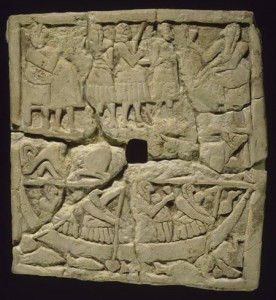 (giant Anunnaki gods feasting & drinking)
(giant Anunnaki gods feasting & drinking)
180-191 Then Enki spoke to Enlil:
“Father Enlil, Sheep and Grain should be sisters!
They should stand together!
Of their threefold metal …… shall not cease.
But of the two, Grain (Nisaba, Enlil’s mother-in-law) shall be the greater.
Let Sheep (unidentified goddess) fall on her knees before Grain.
Let her kiss the feet of …….
From sunrise till sunset, may the name of Grain be praised.
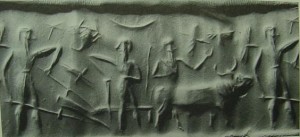 (earthlings taught to farm by & for the gods)
(earthlings taught to farm by & for the gods)
People should submit to the yoke of Grain.
Whoever has silver, whoever has jewels, whoever has cattle,
whoever has sheep shall take a seat at the gate of whoever has grain, and pass his time there.”
192-193 Dispute spoken between Sheep and Grain:
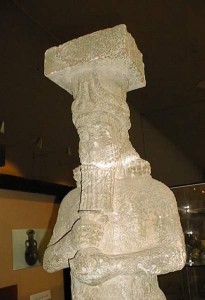 (Enki, Anu‘s eldest & wisest son, 1st to arrive on Earth, replaced by Enlil on being Anu‘s heir)
(Enki, Anu‘s eldest & wisest son, 1st to arrive on Earth, replaced by Enlil on being Anu‘s heir)
Sheep is left behind and Grain comes forward — praise be to father Enki!
How Grain Came to Sumer
Source: Black, J.A., Cunningham, G., Robson, E., and Zólyomi, G., T he Electronic Text Corpus of Sumerian Literature, Oxford 1998-.
(Texts: All Artifacts, Color Coding, & Writings in Bold Type With Italics Inside Parenthesis, are Added by Editor R. Brown, not the Authors, Translators, or Publishers!)
(gods in blue)
1-12 Men used to eat grass with their mouths like sheep.
In those times, they did not know grain, barley or flax.
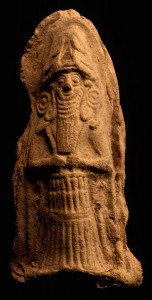
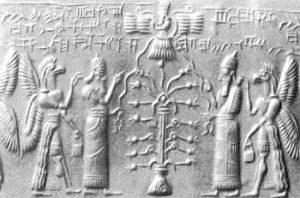 (Anu, King of the entire planet of Nibiru, alien ONE WORLD ORDER; ruler of sons who came down to colonize the Earth)
(Anu, King of the entire planet of Nibiru, alien ONE WORLD ORDER; ruler of sons who came down to colonize the Earth)
An (Anu) brought these down from the interior of heaven (planet Nibiru).
Enlil lifted his gaze around as a stag lifts its horns when climbing the terraced …… hills.
He looked southwards and saw the wide sea;
he looked northwards and saw the mountain of aromatic cedars (of Lebanon).
Enlil piled up the barley, gave it to the mountain (modified strain of mountain seed).
He piled up the bounty of the Land, gave the innuha barley to the mountain.
He closed off access to the wide-open hill.
He …… its lock, which heaven and earth shut fast (?), its bolt, which …….
13-20 Then Ninazu (son of Enlil sometimes, son of Ereshkigal sometimes)……,and said to his brother Ninmada:
“Let us go to the mountain, to the mountain where barley and flax grow;
…… the rolling river, where the water wells up from the earth.
Let us fetch the barley down from its mountain, let us introduce the innuha barley into Sumer.
Let us make barley known in Sumer, which knows no barley.”
21-27 Ninmada, the worshipper of An, replied to him: “Since our father has not given the command,
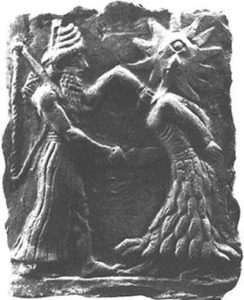 (Enlil, son & heir to planet Nibiru – King Anu, Anu‘s son who came down to Earth, the Earth Colony Commander)
(Enlil, son & heir to planet Nibiru – King Anu, Anu‘s son who came down to Earth, the Earth Colony Commander)
since Enlil has not given the command, how can we go there to the mountain?
How can we bring down the barley from its mountain?
How can we introduce the innuha grain into Sumer?
How can we make barley known in Sumer, which knows no barley?

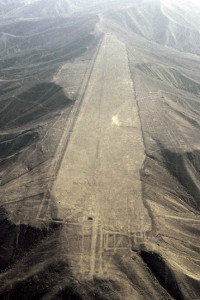
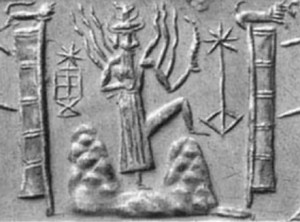 (Utu, Space Port Commander, Utu cuts tops off mountains with alien high-tech saw, to make launch & landing sites)
(Utu, Space Port Commander, Utu cuts tops off mountains with alien high-tech saw, to make launch & landing sites)
28-31 ” Come, let us go to Utu (Shamash) of heaven, who as he lies there, as he lies there, sleeps a sound sleep,
to the hero, the son of Ningal (& Nannar, Nannar / Sin‘s spouse), who as he lies there sleeps a sound sleep.
” He raised his hands towards Utu of the seventy doors (?).
32 Utu …… table (?) …….
The Song of the Plowing Oxen: translation
The Electronic Text Corpus of Sumerian Literature
(Texts: All Artifacts, Color Coding, & Writings in Bold Type With Italics Inside Parenthesis, are Added by Editor R. Brown, not the Authors, Translators, or Publishers!)
(gods in blue)
1-6 ellu mallu!
Go, oxen, go, put your necks under the yoke!
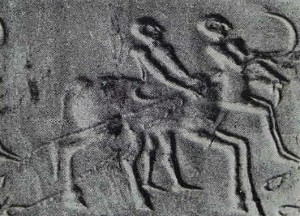 (earthlings taught the use of oxen by the alien giant gods)
(earthlings taught the use of oxen by the alien giant gods)
Go, …… oxen, go, put your necks under the yoke!
I am …… of the country.
(Enlil, giant alien Anunnaki heir to King Anu‘s throne, Anu‘s Earth Colony Commander, leader of the Anunnaki giants)
I am …… of Enlil.
I am …… of the Land.
7-20 ellu mallu!
6 lines fragmentary or missing
And now, may the mother …… with me;
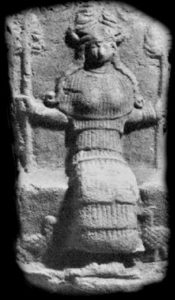 (Enki‘s daughter Nanshe / Nance, Goddess of Persian Gulf Birds & Fishes, her symbol is pelican, or fish)
(Enki‘s daughter Nanshe / Nance, Goddess of Persian Gulf Birds & Fishes, her symbol is pelican, or fish)
and now, may Nance (Enki & Ninhursag‘s daughter)…… with me.
May she put bread in my leather bag, may she pour water into my waterskin.
May she stand by for me …….
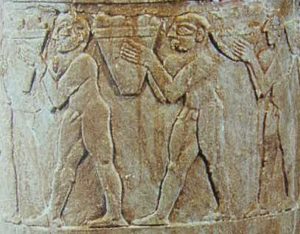
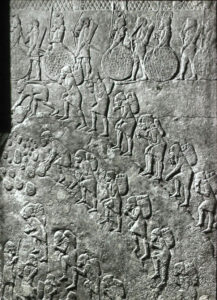 (produce of earthling labor, workers fashioned into their image, & into their likeness, for the gods benefit of replacement laborers)
(produce of earthling labor, workers fashioned into their image, & into their likeness, for the gods benefit of replacement laborers)
May she say to me, “Farmer, eat the bread!”, may she say to me, “Farmer, drink the water!”
21-37 ellu mallu!
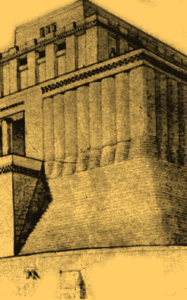
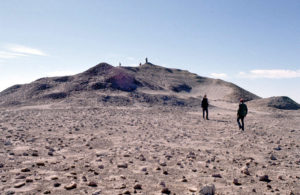 (re-creation of Enki‘s ziggurat / residence in Eridu; ruins of the ziggurat & city discovered after thousands of forgotten years in time)
(re-creation of Enki‘s ziggurat / residence in Eridu; ruins of the ziggurat & city discovered after thousands of forgotten years in time)
In the temple he lay down to dream with Nance.
He said good night (?) to Nance.
He had his leather bag filled with bread, he had water poured into his waterskin.
She stood by for him …….
The farmer had a vision (?): a young bull was talking ……, …… tied the feet (?).
The farmer said to his mother, “Bread was put for me in my leather bag,
water was poured for me into my waterskin. …… stood by for me.”
4 lines missing or fragmentary
38-61 ellu mallu!
What ……?
What ……?
Who ……?
Who ……?
Who …… the clods?
Who …… the birds?
On the right ……, on the left …….
1 line fragmentary
“My big hooves …….”
The stars in the sky ……. …… will make straight its …….
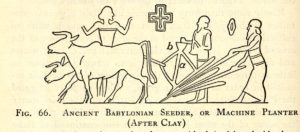 (alien gods prepare modern mankind for self-survival)
(alien gods prepare modern mankind for self-survival)
The ox …… let his thick tongue hang down, …… he replied,
“I am an ox, but just a young ox, in whose muzzle hair has not yet grown.
No dust has fallen yet on my shoulders.
My master, why am I so valuable?”
“My stalwart calf, I shall speak to you only once, so pay attention.
What a plow (?)! Your fathers are four.
What a plow (?)! Your mothers are eight.
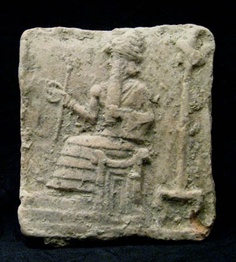 (Utu, Enlil‘s grandson, commander of their space port by his patron city Sippar)
(Utu, Enlil‘s grandson, commander of their space port by his patron city Sippar)
May Utu guide straight your fine plow!”
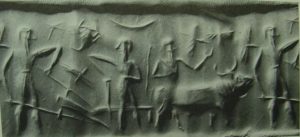 (earthlings in the “Eden” / Sumer, replacing alien minor gods)
(earthlings in the “Eden” / Sumer, replacing alien minor gods)
62-65 ellu mallu!
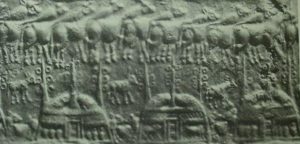 (aliens 1st granaries & cattle pens on Earth Colony)
(aliens 1st granaries & cattle pens on Earth Colony)
The early-working farmer, the shepherd of the holy cattle-pen, the young man who, since his youth,
has had a wife and has had sons, does not …… alone.
66-91 ellu mallu!
(our Solar System on a 5,000 year old tablet; earthling shepherd, Ninurta, & Enlil handing over burdens of the plow to mankind)
I …… the stars in the sky,
I …… a gleam in the sky.
I …… the bedding on the roof.
22 lines fragmentary or missing
92-118 ellu mallu!
Enkimdu, he of dykes and canals, says to the lord ……,
“My king, I want to ……. I will irrigate your fertile fields …….
The early rain ……”
11 lines fragmentary or missing
119-142 ellu mallu!
The harrow, the comb of my field, must be fitted with large teeth to harrow the holy field.
The mattock must dig the edges. Remove the stumps!
The mattock must dig the edges.
Once you have taken down from the beam your holy plow which was hanging from a beam,
a skilled carpenter must tighten its bonds. …… its side boards.
13 lines missing or fragmentary
…… the measuring reed in his right hand.
Enkimdu, he of dykes and canals ……, should …… for you in …….
143-148 ellu mallu!
Go, oxen, go, put your necks under the yoke!
Go, …… oxen, go, put your necks under the yoke!
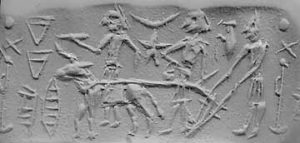 (early earthlings & plow with seed feeder, taught by the gods)
(early earthlings & plow with seed feeder, taught by the gods)
Tread the furrows of the fertile field, walk the sides straight.
In the alehouse, the joy ……, ……Inana (Inanna) …… a place of relaxation.
…… is restored again …….
(Ninurta, Enlil‘s son & heir apparent; Ninurta as sphinx at the gates; Ninurta)
149 An ululumama song of Ninurta.
The Farmer’s Instructions
The Electronic Text Corpus of Sumerian Literature
The Sumerian Farmer´s Instructions was inscribed about 1,700 BCE, thus predating Hesiod´s work by approximately a millennium. The piece is also known as The Instructions of Ninurta.
(Texts: All Artifacts, Color Coding, & Writings in Bold Type With Italics Inside Parenthesis, are Added by Editor R. Brown, not the Authors, Translators, or Publishers!)
(gods in blue)
1 Ud-ul-uru (Old man cultivator) gave advice to his son:
2-7 “When you have to prepare a field, inspect the levees, canals and mounds that have to be opened.
When you let the flood water into the field, this water should not rise too high in it.
At the time that the field emerges from the water, watch its area with standing water; it should be fenced.
Do not let cattle herds trample there.
8-13 After you cut the weeds and establish the limits of the field,
level it repeatedly with a thin hoe weighing two-thirds of a mina (approx. 650 g).
Let a flat hoe erase the oxen tracks, let the flied be swept clean.
A maul should flatten the furrow bottoms of the area.
A hoe should go round the four edges of the field.
Until the field is dry it should be smoothed out.
14-22 Your implements should be ready.
The parts of your yoke should be assembled.
Your new whip should hang from a nail —
the bindings of the handle of your old whip should be repaired by artisans.
The adze, drill and saw, your tools and your strength, should be in good order.
Let braided thongs, straps, leather wrappings and whips be attached securely.
Let your sowing basket be checked, and its sides made strong.
What you need for the field should be at hand.
Inspect your work carefully.
 (earthlings learn to work for the gods in the fields)
(earthlings learn to work for the gods in the fields)
23-29 The plow oxen will have back-up oxen.
The attachments of ox to ox should be loose.
Each plow will have a back-up plow.
The assigned task for one plow is 180 iku (approx. 65 ha),
but if you build the implement at 144 iku (approx. 52 ha), the work will be pleasantly performed for you.
180 (?) sila of grain (approx. 180 liters) will be spent on each 18 iku area (approx. 6 1/2 ha).
30-34 After working one plow’s area with a bardil plow,
 (earthlings & animal workers for the gods)
(earthlings & animal workers for the gods)
and after working the bardil plow’s area with a tugsig plow, till it with the tuggur plow.
Harrow once, twice, three times.
When you flatten the stubborn spots with a heavy maul,
the handle of your maul should be securely attached, otherwise it will not perform as needed.
35-40 When your field work becomes excessive, you should not neglect your work;
no one should have to tell anyone else: “Do your field work!”.
When the constellations in the sky are right, do not be reluctant to take the oxen force to the field many times.
The hoe should work everything.
41-45 When you have to work the field with the seeder-plow, your plow should be properly adjusted.
Put a leather sealing on the kacu of your plow.
Provide your beam with narrow pegs.
Your boards should be spread. Make your furrows.
46-54 Make eight furrows per ninda of width (approx. 6 m); the barley will lodge in more closely spaced furrows.
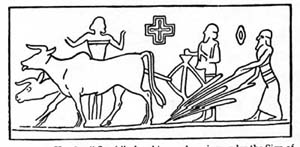 (knowledge learned from the alien gods)
(knowledge learned from the alien gods)
When you have to work the field with the seeder-plow, keep your eye on the man who drops the seed.
The grain should fall two fingers deep (approx. 3 1/2 cm).
You should put one gij of seed per ninda (approx. 3 ml/m).
If the barley seed is not being inserted into the hollow of the furrow, change the wedge of your plow share.
If the bindings become loose, tighten them.
55-63 Where you have made vertical furrows, make slanted furrows,
and where you have made slanted furrows, make vertical furrows.
Straight furrows will give you edges that are wide enough and nice (?).
Your crooked furrows should be straightened out.
Make the furrows clear.
Plow your portion of field.
The clods should be picked out.
The furrows should be made wide where the soil is open,
and the furrows should be narrower where the soil is clogged: it is good for the seedlings.
64-73 After the seedlings break open the ground, perform the rites against mice.
Turn away the beaks of small birds.
When the plants overflow the narrow bottoms of the furrows, water them with the water of the first seed.
When the plants resemble a …… reed mat, water them.
Water the plants when they are heading.
When the plants are fully leafed out, do not water them or they will become infected by leaf rust.
When the barley is right for husking, water it.
It will provide a yield increase of one sila per ban (approx. 1 liter in 10).
74-80 When you have to reap the barley, do not let the plants become overripe.
Harvest at the right time.
One man is to cut the barley, and one to tie the sheaves;
and one before him should apportion the sheaves: three men should harvest for you.
Do not let those who gather the barley bruise the grain.
They should not scatter the grain when it is in the stacks.
81-90 Your daily work starts at daybreak.
Gather your force of helpers and grain gatherers in sufficient number and lay down the sheaves.
Your work should be carefully done.
Although they have been having stale coarse flour,
do not let anyone thresh for your new bread — let the sheaves have a rest.
The rites for the sheaves should be performed daily.
When you transport your barley, your barley carriers should handle small amounts (?).
91-95 Mark the limits of a vacant lot of yours.
Establish properly your access paths to it.
Your wagons should be in working order.
Feed the wagon’s oxen. Your implements should be …….
96-103 Let your prepared threshing floor rest for a few days.
When you open the threshing floor, smooth its surface (?).
When you thresh, the teeth of your threshing sledge and its leather straps should be secured with bitumen.
When you make the oxen trample the grain, your threshers should be strong.
When your grain is spread on the ground, perform the rites of the grain not yet clean.
104-106 When you winnow, put an intelligent person as your second winnower.
Two people should work at moving the grain around.
107-109 When the grain is clean, lay it under the measuring stick.
Perform the rites in the evening and at night.
Release the grain at midday.
(giant mixed-breed shepherd, Ninurta, & plow given earthlings by Enlil)
110-111 Instructions of the god Ninurta, son of Enlil —
(alien giant Anunnaki did the burdensome work with much complaint, prior to fashioned earthling workers)
The Song of the Hoe: translation
The Electronic Text Corpus of Sumerian Literature
(Texts: All Artifacts, Color Coding, & Writings in Bold Type With Italics Inside Parenthesis, are Added by Editor R. Brown, not the Authors, Translators, or Publishers!)
(gods in blue …mixed-breed demigods in teal…)
(Ninhursag‘s creature creation = Enkidu)
In this composition, the word al ‘hoe’ is used as often as possible, as well as many nouns or verb forms beginning with — or merely containing — the syllable al (occasionally also ar).
1-7 Not only did the lord make the world appear in its correct form —
the lord who never changes the destinies which he determines:
 (Enlil, son & heir to Anunnaki King Anu, his father’s Earth Colony Commander, his decisions are final)
(Enlil, son & heir to Anunnaki King Anu, his father’s Earth Colony Commander, his decisions are final)
Enlil, who will make the human seed of the Land come forth
(3 mss. have instead: up) from the earth (2 other mss. have instead: chamber) —
and not only did he hasten to separate heaven from earth, and hasten to separate earth from heaven,
but, in order to make it possible for humans to grow in ‘Where Flesh Came Forth’
(2 mss. have instead: ‘Where Flesh Grew’) [the name of a cosmic location],
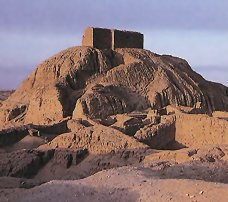 (Enlil‘s residence & Earth Colony Command Center in his city of Nippur)
(Enlil‘s residence & Earth Colony Command Center in his city of Nippur)
he first suspended (2 mss. have instead: raised) the axis of the world at Dur-an-ki (“Bond Heaven and Earth”).
8-17 He did this with the help of the hoe (al) — and so daylight broke forth (aled).
By distributing (altare) the shares of duty he established daily tasks,
and for the hoe (al) and the carrying-basket wages were even established.
Then Enlil praised his hoe (al), his hoe (al) wrought in gold,
its top inlaid with lapis lazuli (blue-hued gem stone), his hoe (al) whose blade was tied on with a cord,
which was adorned with silver and gold, his hoe (al), the edge of whose point (?) was a plow of lapis lazuli,
whose blade was like a battering ram standing up to a great (gal) wall
(1 ms. has instead: born for a great (gal) person (?)).
The lord evaluated the hoe (al), determined its future destiny and placed a holy crown on its head …….
18-27 Here, in ‘Where Flesh Came Forth’ (1 ms. has instead: ‘Where Flesh Grew’)
[the name of a cosmic location], he set this very hoe (al) to work;
(1 other ms. has instead: in ‘Where Flesh Grew’ the unassailable (?),)
he had it place the first model of mankind in the brick mold (aliens cloning workers, DNA technologies).
His Land started to break through the soil towards Enlil.
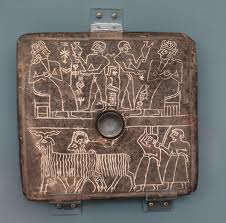 (Enlil & Enki served by earthling primitives, “modern man”)
(Enlil & Enki served by earthling primitives, “modern man”)
He looked with favor at his black-headed people.
Now the Anuna gods stepped forward to him, and did (jal) obeisance to him.
They calmed Enlil with a prayer, for they wanted to demand (al-dug) the black-headed people (workers) from him.
(Ninhursag, Enki, & Ningishzidda worked the DNA mixing of alien giants with upright walking primitives, SEE ADAPA TEXTS)
Ninmena (Ninhursag), the lady who had given birth to the ruler,
(“modern man” fashioned by alien giants, to replace Anunnaki workers from their heavy burdens, Anunnaki leader Enlil demanded workers for Eden from Enki‘s group in the mines of SO Africa, creating problems between the Anunnaki)
who had given birth to the king, now set (aljaja) human reproduction going.
28-34 The leader of heaven and earth, lord Nunamnir (Enlil),
named the important persons and valued (kal) persons.
He …… these persons, and recruited them to provide for the gods (in Eden).
Now Enki praised Enlil‘s hoe (al), and the maiden Nisaba (Enlil‘s mother-in-law) was made responsible
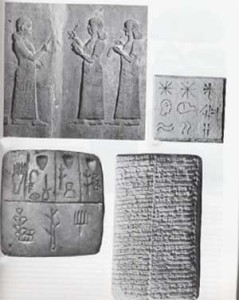 (Nisaba, alien Anunnaki Master Scribe, Goddess of Grains, many of her records discovered)
(Nisaba, alien Anunnaki Master Scribe, Goddess of Grains, many of her records discovered)
for keeping records of the decisions.
And so people took (jal) the shining hoes (al), the holy hoes (al), into their hands.
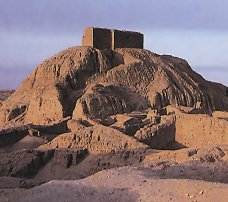 (mud brick-built mountain / temple / residence of Enlil & Ninlil, city of Nippur below)
(mud brick-built mountain / temple / residence of Enlil & Ninlil, city of Nippur below)
35-42 The E-kur, the temple of Enlil, was founded by the hoe (al).
By day it was building (aldue) it, by night it caused the temple to grow (almumu).
(earthling mixed-breed shepherd, Ninurta, & Enlil handing earthlings the burden of the plow, our solar system in background)
In well-founded Nibru, the hero Ninurta entered into the presence of Enlil
in the inner chamber of the Tummal –the Tummal, the bread basket (?)
(1 ms. has instead: …… masterpiece (?)) of mother Ninlil —
the innermost chamber of the Tummal, with regular food deliveries.
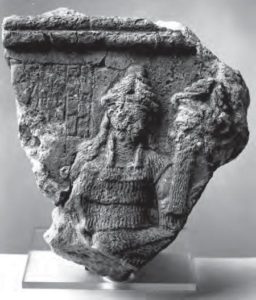 (Bau & her nephew-spouse Ninurta, Enlil‘s son & heir)
(Bau & her nephew-spouse Ninurta, Enlil‘s son & heir)
Holy Ninisina (Bau / Gula) entered into the presence of Enlil with black kids and fruit offerings for the lord.
43-45 Next comes the Abzu, with the lions before it,
where the divine powers (alien technologies) may not be requested (al-dug): the hoe wielder (?) (altar), the good man,
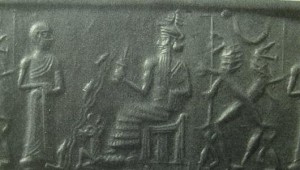

(1st “modern man” the “mold” to start the new species of advanced earthlings, Enki, the DNA Master; Enki‘s house in Eridu)
lord Nudimmud (Enki) was building (aldue) the Abzu, Eridug having been chosen as the construction site (altar).
(Ninhursag‘s early failed attempts to fashion workers for the alien Anunnaki gods; her city walls of Kish)
46-48 The mother of the gods, Ninhursaja (Ninhursag),
had the mighty (?) (altar) light of the lord live with her in Kec (Kish);
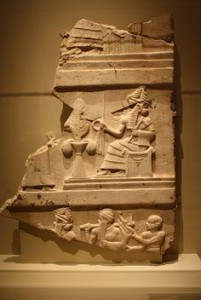 (Enlil seated, below Ninurta leads mixed-breed king & workers to alien ziggurat construction site)
(Enlil seated, below Ninurta leads mixed-breed king & workers to alien ziggurat construction site)
she had Cul-pa-eda (Ninurta), no less, help her with the construction work (altar).
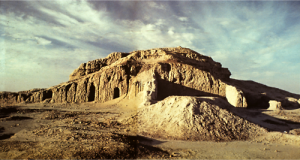 (Anu‘s, Inanna‘s, Ninsun‘s, etc. residence in Uruk)
(Anu‘s, Inanna‘s, Ninsun‘s, etc. residence in Uruk)
49-51 The shrine E-ana (Anu‘s temple – residence in Uruk)
was cleaned up by means of the hoe (al) for the lady of E-ana, the good cow (immal) (2 mss. have instead: woman).
The hoe (al) deals with ruin mounds, the hoe (al) deals with weeds.
52-55 In the city of Zabalam (city loyal to Inanna), the hoe (al) is Inanna‘s workman (?).
She determined the destiny of the hoe (al), with its projecting lapis-lazuli beard (1 ms. has instead: tooth).
(Utu, grandson to Enlil, the Space Port Commander in Sippur; launch & landing zones cut into the mountains by Utu)
Utu was ready to help her with her building project (altar);
it is the renowned (?) building project (altar) of youthful Utu.
(Nisaba, spouse to Haia, Ninlil‘s mother, Master Anunnaki Scribe, Goddess of Grains, hoe & plow)
56-58 The lady with broad (dajal) intelligence, Nisaba,
ordered the measuring of the E-ana for a construction project (altar),
and then designed her own E-hamun (in Uruk) for construction (altar).
59-70 The king who measured up the hoe (al) and who passes (zal) his time in its tracks,
 (planet Nibiru‘s cross symbol in the sky)
(planet Nibiru‘s cross symbol in the sky)
the hero Ninurta, has introduced working with the hoe (altar) into the rebel (bal) lands.
He subdues (aljaja) any city that does not obey its lord.
Towards heaven he roars (algigi) like a storm, earthwards he strikes (aljaja) like a dragon (ucumgal).
Cara (Shara, Inanna‘s son, Roman god Cupid) sat down on (1 ms. has instead: got onto) Enlil‘s knees,
and Enlil gave him what he had desired (al-dug):
he had mentioned the mace, the club, arrows and quiver, and the hoe (al)
(3 mss. have instead: he desired (al-dug) the mace, the club, arrows and quiver).
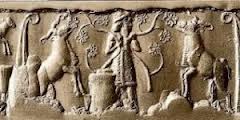 (Dumuzi The Shepherd, Enki‘s & Ninsun‘s son, young Inanna‘s spouse)
(Dumuzi The Shepherd, Enki‘s & Ninsun‘s son, young Inanna‘s spouse)
Dumuzid (Dumuzi) is the one who makes the upper land fertile (allumlum).
Gibil (god of the fiery kilns, metal fashioner) made his hoe (al) raise its head towards the heavens —
he (Enki‘s son of metallurgy) caused the hoe (al), sacred indeed, to be refined with fire.
The Anuna (Anunnaki) were rejoicing (alhulhuledec).
71-82 The temple of Jectin-ana (Geshtinanna, Enki‘s daughter) resembled an aljarsur instrument,
the aljarsur of mother Jectin-ana (goddess of songs) that makes a pleasant sound.
(Enlil Haia Nisaba Ninlil unidentified)
The lord [Enlil] bellowed at his hoe (al) like a bull.
As for the grave (irigal): the hoe (al) buries people,
but dead people are also brought up from the ground by the hoe (al)
[This may allude to Enkidu‘s ghost being put in contact with Gilgamec.].
With the hoe (al), the hero honored by An (Anu), the younger brother (the grandfather) of Nergal,
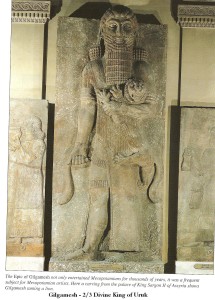 (giant Gilgamesh, son to Ninsun & Lugalbanda, 2/3rds divine, 5th king of Uruk)
(giant Gilgamesh, son to Ninsun & Lugalbanda, 2/3rds divine, 5th king of Uruk)
the warrior Gilgamec is as powerful as a hunting net.
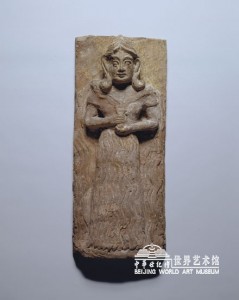 (Ninsun, daughter to Ninurta & Bau, mother to gods & many earthling mixed-breeds made kings)
(Ninsun, daughter to Ninurta & Bau, mother to gods & many earthling mixed-breeds made kings)
The (1 ms. adds: sage) son of Ninsumun (Ninsun) is pre-eminent with oars (jisal)
[This may allude to Gilgamec rowing across the waters of death.].
With the hoe (al) he is the great barber (kindajal) of the watercourses.
In the chamber (1 ms. has instead: place) of the shrine, with the hoe (al) he is the minister (sukkal).
The wicked (huljal) …… are sons of the hoe (al); they are born in sleep from heaven.
83-93 In the sky there is the altirigu bird, the bird of the god.
On the earth there is the hoe (al): a dog in the reed-beds, a dragon (ucumgal) in the forest.
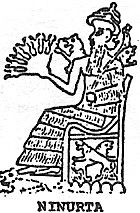 (Ninurta‘s 50-headed mace, alien Anunnaki advanced technologies of weaponry)
(Ninurta‘s 50-headed mace, alien Anunnaki advanced technologies of weaponry)
On the battlefield, there is the dur-allub battle-axe.
By the city wall there is the battle-net (alluhab).
On the dining-table there is the bowl (maltum).
In the wagon shed, there is the sledge (mayaltum).
In the donkey stable there is the cupboard (argibil).
The hoe (al)! — the sound of the word is sweet: it also occurs (munjal)
on the hillsides: the tree of the hillsides is the allanum oak.
The fragrance of the hillsides is the arganum balm.
The precious stone of the hillsides is the algamec steatite.
94-106 The hoe (al) makes everything prosper, the hoe makes everything flourish.
The hoe (al) is good barley, the hoe (al) is a hunting net (1 ms. has instead: an overseer).
The hoe (al) is brick molds, the hoe (al) has made people exist (jal).
It is the hoe (al) that is the strength of young manhood.
The hoe (al) and the basket are the tools for building cities.
It builds (aldue) the right kind of house, it cultivates (aljaja) the right kind of fields.
It is you, hoe, that extend (dajal) the good agricultural land!
The hoe (al) subdues for its owner (lugal) any agricultural lands
that have been recalcitrant (bal) against their owner (lugal),
any agricultural lands that have not submitted to their owner (lugal).
It chops the heads off the vile esparto grasses, yanks them out at their roots, and tears at their stalks.
The hoe (al) also subdues (aljaja) the hirin weeds.
107-109 The hoe (al), the implement whose destiny was fixed by father Enlil—the renowned hoe (al)!
(Nisaba 2 gods unidentified spouse Haia daughter Ninlil)
Nisaba (Ninlil‘s mother, Haia‘s spouse, Enlil‘s mother-in-law) be praised!
The Debate Between the Hoe and the Plow: translation
The Electronic Text Corpus of Sumerian Literature,
(Texts: All Artifacts, Color Coding, & Writings in Bold Type With Italics Inside Parenthesis, are Added by Editor R. Brown, not the Authors, Translators, or Publishers!)
(gods in blue)
1-6 O the Hoe, the Hoe, the Hoe, tied together with thongs;
the Hoe, made from poplar, with a tooth of ash;
the Hoe, made from tamarisk, with a tooth of sea-thorn; the Hoe, double-toothed, four-toothed;
the Hoe, child of the poor, …… bereft even of a loin-cloth (?) — the Hoe started a quarrel …… with the Plow.
(when the alien Anunnaki gods did the work on Earth Colony)
7-19 The Hoe having engaged in a dispute with the Plow, the Hoe addressed the Plow:
“Plow, you draw furrows –what does your furrowing matter to me?
You break clods — what does your clod-breaking matter to me?
When water overflows you cannot dam it up.
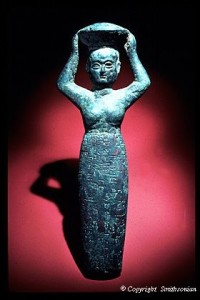 (Nisaba, Enlil‘s mother-in-law, Goddess of Grain)
(Nisaba, Enlil‘s mother-in-law, Goddess of Grain)
You cannot fill baskets with earth.
You cannot spread out clay to make bricks.
You cannot lay foundations or build a house.
You cannot strengthen an old wall’s base.
You cannot put a roof on a good man’s house.
Plow, you cannot straighten the town squares.
(in the beginning, giant alien gods from Nibiru had to do the work of men during early settlement period)
Plow, you draw furrows — what does your furrowing matter to me?
You make clods — what does your clod-making matter to me?”
20-33 The Plow addressed the Hoe: “I am the Plow, fashioned by great strength,
(Enlil finally hands the plow over to earthlings to endure their workloads forced upon modern man, farming, sheep-herding, etc.)
assembled by great hands, the mighty registrar of father Enlil.
I am mankind’s faithful farmer.
To perform my festival in the fields in the harvest month,
the king slaughters cattle and sacrifices sheep, and he pours beer into a bowl.
The king offers the …… libation.
The ub and ala drums resound.
(1 ms. adds 1 line:1 line fragmentary)
 (alien giants taught mankind to farm for the gods)
(alien giants taught mankind to farm for the gods)
The king takes hold of my handles, and harnesses my oxen to the yoke.
All the great high-ranking persons walk at my side.
All the lands gaze at me in great admiration.
The people watch me in joy.
(earthlings take on the burdensome yoke of hard labor, working for the alien giant gods)
34-40 “The furrow tilled by me adorns the plain.
Before the stalks erected by me in the fields, the teeming herds of Cakkan kneel down.
In performing my labor amid the ripened barley, (1 ms. adds 2 lines: I vie with the mighty scythe (?).
After the reaped …… and the grain have been gathered,) the shepherd’s churn is improved.
(Inanna spouse Dumuzi “The Shepherd”, later taught Abel to tend sheep for the alien gods)
With my sheaves spread over the meadows the sheep of Dumuzid (Dumuzi) are improved.
41-51 “My threshing-floors punctuating the plain are yellow hillocks radiating beauty.
I pile up stacks and mounds for Enlil.
I amass emmer and wheat for him.
I fill the storehouses of mankind with barley.
The orphans, the widows and the destitute take their reed baskets and glean my scattered ears.
People come to drag away my straw, piled up in the fields.
The teeming herds of Cakkan thrive.
52-56 “Hoe, digging miserably, weeding miserably with your teeth; Hoe, burrowing in the mud;
Hoe, putting its head in the mud of the fields, spending your days with the brick-molds in mud
with nobody cleaning you, digging wells, digging ditches, digging ……!
57-62 “Wood of the poor man’s hand, not fit for the hands of high-ranking persons,
the hand of a man’s slave is the only adornment of your head.
You deliver deep insults to me.
You compare yourself to me.
When I go out to the plain, everyone looks on but (2 mss. add 1 line: the Hoe does not …… the Plow, and)
insultingly you call me “Plow, the digger of furrows”.”
63-66 Then the Hoe addressed the Plow:
“Plow, what does my being small matter to me, what does my being exalted matter to me,
what does my being powerful matter to me? — at Enlil‘s place I take precedence over you,
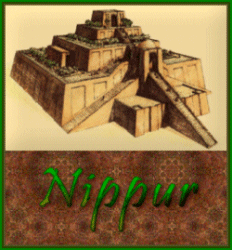
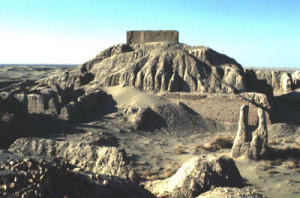 (E-kur, Enlil’s residence in Nippur)
(E-kur, Enlil’s residence in Nippur)
in Enlil‘s temple (residence & Anunnaki Command Central) I stand ahead of you.
67-75 “I build embankments, I dig ditches.
I fill all the meadows with water.
When I make water pour into all the reed-beds, my small baskets carry it away.
When a canal is cut, or when a ditch is cut, when water rushes out at the swelling of a mighty river,
creating lagoons on all sides (?), I, the Hoe, dam it in.
Neither south nor north wind can separate it.
76-79 “The fowler gathers eggs.
The fisherman catches fish.
People empty bird-traps.
Thus the abundance I create spreads over all the lands.
80-90 “After the water has been diverted from the meadows
and the work on the wet areas is taken in hand,
Plow, I come down to the fields before you.
I initiate the opening up of the field for you.
I clear the recesses of the embankment for you.
I remove the weeds in the field for you.
I heap up the stumps and the roots in the field for you.
But when you work the field, there is a procession (?):
your oxen are six, your people four — you yourself are the eleventh …….
…… the preparatory work in the field.
And you want to compare yourself with me?
91-103 “When you come out to the field after me, your single furrow brings you pleasure.
When you put your head to work and get entangled in roots and thorns, your tooth breaks.
Once your tooth is fixed, you cannot hold onto your tooth.
Your farmer calls you “This Plow is done for”.
Carpenters have to be hired again for you, people …… for you.
A whole workshop of artisans surrounds you.
The fullers depilate a …… fleece for you.
They stretch it over the wringer for you.
They toil at the straps for you — then they place the foul hide on your head.
104-108 “Your work is slight but your behavior is grand.
My time of duty is twelve months, but your effective time is four months
and your time of absence is eight months — you are gone for twice as long as you are present.
109-116 “Upon your boat (?) you make a hut.
When you are put on board and your “hands” rip out the beams,
your “face” has to be pulled from the water like a wine-jar.
After I have made a pile of logs (?) my smoke dries you out in the house.
What happens to your seeding-funnel if it once falls?
Anyone who drops you smashes it, making it a completely destroyed tool.
117-121 “I am the Hoe and I live in the city.
No one is more honored than I am.
I am a servant following his master.
I am one who builds a house for his master.
I am one who broadens the cattle-stalls, who expands the sheepfolds.
122-126 “I spread out clay and make bricks.
I lay foundations and build a house.
I strengthen an old wall’s base.
I put a roof on a good man’s house.
I am the Hoe, I straighten the town-squares.
127-131 “When I have gone through the city and built its sturdy walls,
have made the temples of the great gods splendid
and embellished them with brown, yellow and decorative (?) clay,
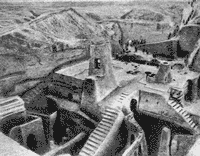 (mud brick-built mountains / residences of the giant alien gods)
(mud brick-built mountains / residences of the giant alien gods)
I build in the city of the palace where the inspectors and overseers live.
132-138 “When the weakened clay has been built up and the fragile (?) clay buttressed,
they refresh themselves when the time is cool in houses I have built.
When they rest on their sides by a fire which a hoe has stirred up,
you do not come to the joyous celebration (?).
They feed the laborer, give him drink and pay him his wages:
thus I have enabled him to support his wife and children.
139-141 “I make a kiln for the boatman and heat pitch for him.
By fashioning magur and magilum boats for him, I enable the boatman to support his wife and children.
142-150 “I plant a garden for the householder.
When the garden has been encircled, surrounded by mud walls
and the agreements reached, people again take up a hoe.
When a well has been dug, a water lift constructed and a water-hoist hung, I straighten the plots.
I am the one who puts water in the plots.
After I have made the apple-tree grow, it is I who bring forth its fruits.
These fruits adorn the temples of the great gods:
thus I enable the gardener to support his wife and children.
151-158 “After I have worked on the watercourse and the sluices, put the path in order
and built a tower there on its banks, those who spend the day in the fields,
and the field-workers who match them by night, go up into that tower.
These people revive themselves there just as in their well-built city.
The water-skins I made they use to pour water.
I put life into their hearts again.
159-162 “Insultingly you call me “Plow, the digger of ditches”.
But when I have dug out the fresh water for the plain and dry land where no water is,
those who have thirst refresh themselves at my well-head.
163-173 “What then does one person say to another?
What does one tell another in detail?:
“The shepherd adorns the plain with his ewes and lambs.
After the heavens had been turned upside down, after bitter lament had been imposed on Sumer,
after, as houses were overwhelmed by the rivers and Enlil frowned in anger upon the land,
 (Enlil, son & heir to King Anu, leader of the Anunnaki giants in Heaven & on Earth)
(Enlil, son & heir to King Anu, leader of the Anunnaki giants in Heaven & on Earth)
Enlil had flooded the harvest, after Enlil had acted mightily thus,
Enlil did not abandon us — the single-toothed Hoe was struck against the dry earth.
174-178A ”For us you raise winter like the harvest-time.
We take away the hand of summer and winter.
Hoe, the binder, ties the sheaves.
Binding bird-traps, it ties the reed-baskets.
The solitary laborer and the destitute are supported. (2 mss. add 1 line: They glean the scattered ears.)“
179-185 Then the Storm spoke: “The mortar lies still while the pestle pounds.
People fight with grinding stones.
The sieve disputes with the strainer.
What have you done to the one who is angry?
Why are you scornful of Ezina (grain goddess Nisaba or daughter Ninlil)?
Why do you swap names (?) over the ripened grain
(1 ms. has instead: Why, Plow, is the ripened grain in your seeding-funnel)?”
186-193 Enlil addressed the Hoe: “Hoe, do not start getting so mightily angry!
Do not be so mightily scornful! Is not Nisaba the Hoe’s inspector?
(Enlil, parent in-laws Haia & Nisaba, spouse Ninlil, unidentified)
Is not Nisaba its overseer?
The scribe will register your work, he will register your work.
Hoe, whether he enters five or ten gij in your account,
Hoe — or, Hoe, whether he enters one-third or one-half mana in your account,
Hoe, like a maid-servant, always ready, you will fulfill your task.”
194-196 The Hoe having engaged in a dispute with the Plow,
the Hoe triumphed over the Plow — praise be to Nisaba!
(Haia Enlil unidentified god Nisaba, Master Scribe & Goddess of Grains)
Advice to a Prince
Source: Lambert, W. G. Babylonian Wisdom Literature.
From the Oxford University Press edition published in 1963, reprinted in 1996 by Eisenbrauns, here included for aid in research and studies purposes
(Texts: All Artifacts, Color Coding, & Writings in Bold Type With Italics Inside Parenthesis, are Added by Editor R. Brown, not the Authors, Translators, or Publishers!)
(gods in blue)
1. If a king does not heed justice, his people will be thrown into chaos and his land will be devastated.
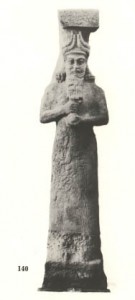 (Enki, alien King Anu‘s eldest & wisest son, 1st to arrive on Earth with a crew of 50 Anunnaki)
(Enki, alien King Anu‘s eldest & wisest son, 1st to arrive on Earth with a crew of 50 Anunnaki)
2. If he does not heed the justice of his land, Ea (Enki), king of destinies,
3. Will alter his destiny and he will not cease from hostilely pursuing him.
4. If he does not heed his nobles, his life will be cut short.
5. If he doe snot heed his adviser, his land will rebel against him.
6. If he heeds a rogue, the status quo in his land will change.
7. If he heeds a trick of Ea, the great gods
8. In unison and in their just ways will not cease from prosecuting him.
9. If he improperly convicts a citizen of Sippar, but acquits a foreigner, Shamash (Utu), judge of heaven and earth,
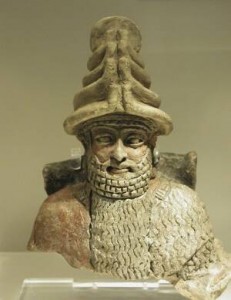 (Utu / Shamash, son to Nannar, patron god of Sippar, lord of justice)
(Utu / Shamash, son to Nannar, patron god of Sippar, lord of justice)
10. Will set up a foreign justice in his land, where the princes and judges will not heed justice
11. If citizens of Nippur are brought to him for judgment, but he accepts a present and improperly convicts them
 (Enlil, Earth Colony Commander, son & heir to King Anu of Nibiru, Enlil, then followed by Ninurta)
(Enlil, Earth Colony Commander, son & heir to King Anu of Nibiru, Enlil, then followed by Ninurta)
12.Enlil, lord of the lands, will bring a foreign army against him
13. to slaughter his army,
14. whose prince and chief officers will roam his streets like fighting-cocks.
15. If he takes silver of the citizens of Babylon and adds it to his own coffers,
16. Of if he hears a lawsuit involving men of Babylon but treats it frivolously,
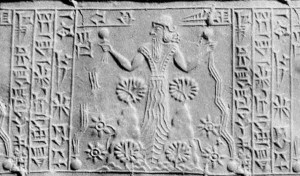 (Marduk, Enki‘s eldest son, patron god of Babylon & later Egypt, Ninurta‘s rival)
(Marduk, Enki‘s eldest son, patron god of Babylon & later Egypt, Ninurta‘s rival)
17. Marduk, lord of Heaven and earth, will set his foes upon him,
18. And will give his property and wealth to his enemy.
19. If he imposes a fine on the citizens of Nippur, Sippar or Babylon,
20. Of if he puts them in prison,
21. The city where the fine was imposed will be completely overturned,
22. And a foreign enemy will make his way into the prison in which they were put.
23. If he mobilized the whole of Sippar, Nippur and Babylon,
24. And imposed forced labor on the people,
25. Exacting from them a corvée at the herald´s proclamation,
26. Marduk, the sage of the gods, the prince, the counselor,
27. Will turn his land over to his enemy
28. So that the troops of his land will do forced labor for his enemy,
(Apkulla / pilot, Enki, father Anu in his sky-disc, Anu‘s heir Enlil, & winged eagle-headed Apkulla / pilot)
29. For Anu, Enlil and Ea (Enki),the great gods,
30. Who dwell in heaven and earth, in their assembly affirmed the freedom of those people from such obligations.
31, 32. If he gives the fodder of the citizens of Sippar, Nippur and Babylon to his own steeds,
33. The steeds who eat the fodder
34. Will be led away to the enemy´s yoke,
35. And those men will be mobilized with the king´s men when the national army is conscripted.
(Nergal with alien high-tech alien weaponry; symbol of Nergal, god of the Under World / Netherworld / Lower World)
36. Mighty Erra (Nergal), who goes before his army,
37. Will shatter his front line and go at this enemy´s side.
38. If he looses the yokes of their oxen,
39. And puts them into other fields
40. Or gives them to a foreigner, […] will be devastated […] of Addu.
41. If he seizes their … stock of sheep,
42. Addu, (Adad) canal supervisor of heaven and earth,
43. Will extirpate his pasturing animals by hunger
44. And will amass offerings for Shamash (Utu, the Sun god).
45. If the adviser or chief officer of the king´s presence
46. Denounces them (i.e. the citizens of Sippar, Nippur and Babylon) and so obtains bribes from them,
47. At the command of Ea (Enki), king of the Apzu (swamp waters of Enki‘s domain),
48. The adviser chief officer will die by the sword,
49. Their place will be covered over as a run,
50. The wind will carry away their remains and their achievements will be given over to the storm wind.
51. If he declares their treaties void, or alters their inscribed treaty stelea,
52. Sends them on a campaign or press-gangs them into hard labor,
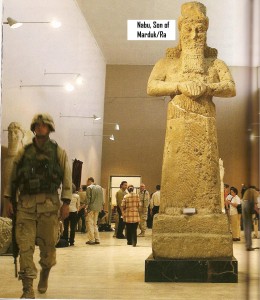 (giant god Nabu / Nebo, son to Marduk, grandson to Enki; this very artifact has now been viciously, & shamefully destroyed by Radical Islam, blindly fearing & so denying, our hidden & forgotten history)
(giant god Nabu / Nebo, son to Marduk, grandson to Enki; this very artifact has now been viciously, & shamefully destroyed by Radical Islam, blindly fearing & so denying, our hidden & forgotten history)
53. Nabu, scribe of Esagila, who organizes the whole of heaven and earth, who directs everything,
54. Who ordains kingship, will declare the treaties of his land void , and will decree hostility.
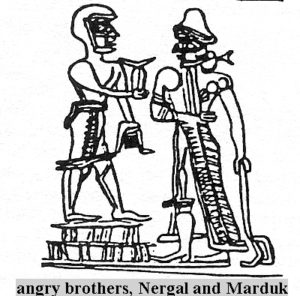 (high-priest atop Marduk‘s ziggurat / residence, & Marduk prepare for war)
(high-priest atop Marduk‘s ziggurat / residence, & Marduk prepare for war)
55. If either a shepherd or a temple overseer, or a chief officer of the king,
56. Who serves as a temple overseer of Sippar, Nippur or Babylon
57. Imposes forced labor on them (i.e. the citizens of Sippar, Nippur and Babylon) in connection with the temples of the great gods,
58. The great gods will quit their dwelling in their fury and
59. Will not enter their shrines.
The Cursing of Agade (Akkad)
The Electronic Text Corpus of Sumerian Literature
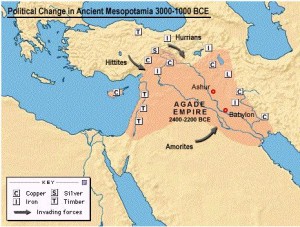 Agade / Akkad, ancient land of alien giants)
Agade / Akkad, ancient land of alien giants)
(Texts: All Artifacts, Color Coding, & Writings in Bold Type With Italics Inside Parenthesis, are Added by Editor R. Brown, not the Authors, Translators, or Publishers!)
(gods in blue …mixed-breed demigods in teal…)
(Enki’s creation = Enkidu, Enlil’s creation = Hawawa)
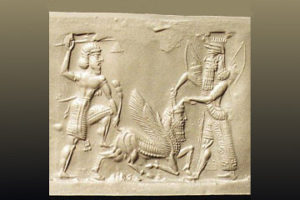 (Bull of Heaven killed)
(Bull of Heaven killed)
After Enlil‘s frown had slain Kic (Kish) as if it were the Bull of Heaven,
had slaughtered the house of the land of Unug (Uruk) in the dust as if it were a mighty bull,
and then Enlil had given the ruler ship and kingship from the south as far as the highlands to Sargon, king of Agade —
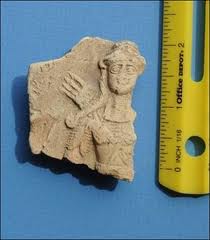 (Inanna with alien technologies, goddess-spouse to mixed-breed made king, Sargon)
(Inanna with alien technologies, goddess-spouse to mixed-breed made king, Sargon)
at that time, holy Inanna established the sanctuary of Agade
as her celebrated woman’s domain; she set up her throne in Ulmac.
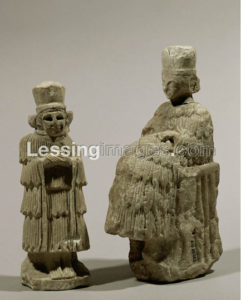
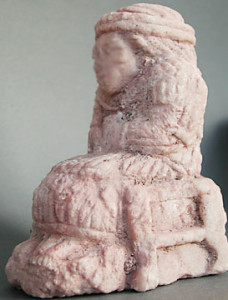 (Inanna seated upon her throne)
(Inanna seated upon her throne)
Like a young man building a house for the first time, like a girl establishing a woman’s domain,
holy Inanna did not sleep as she ensured that the warehouses would be provisioned;
that dwellings would be founded in the city; that its people would eat splendid food;
that its people would drink splendid beverages; that those bathed for holidays would rejoice in the courtyards;
that the people would throng the places of celebration; that acquaintances would dine together;
that foreigners would cruise about like unusual birds in the sky;
that even Marhaci would be re-entered on the tribute rolls;
that monkeys, mighty elephants, water buffalo, exotic animals, as well as thoroughbred dogs, lions,
mountain ibexes (some mss. have instead: mountain beasts (?)) (some mss. have instead: horses),
and alum sheep with long wool would jostle each other in the public squares.
She then filled Agade‘s stores for emmer wheat with gold, she filled its stores for white emmer wheat with silver;
she delivered copper, tin, and blocks of lapis lazuli to its granaries and sealed its silos from outside.
She endowed its old women with the gift of giving counsel, she endowed its old men with the gift of eloquence.
She endowed its young women with the gift of entertaining,
she endowed its young men with martial might, she endowed its little ones with joy.
The nursemaids who cared for (some mss. have instead: of) the general’s children played the aljarsur instruments.
Inside the city tigi drums sounded; outside it, flutes and zamzam instruments.
Its harbor where ships moored was full of joy.
All foreign lands rested contentedly, and their people experienced happiness.
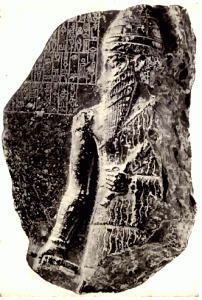 (Narram-Suen, giant mixed-breed made king, grandson to Sargon the Great)
(Narram-Suen, giant mixed-breed made king, grandson to Sargon the Great)
Its king, the shepherd (King) Naram- Suen, rose as the daylight on the holy throne of Agade.
(giant mixed-breed King Narram-Sin with alien technologies – landed shem / command module of an alien sky-ship)
Its city wall , like a mountain, (1 ms. has instead: , a great mountain,) reached the heavens.
It was like the Tigris going to (some mss. have instead: flowing into) the sea
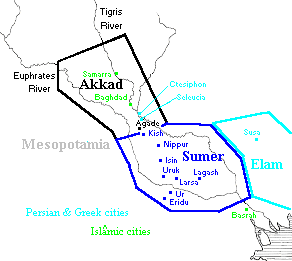 (1st cities on Earth, giant alien gods established in ancient Sumer)
(1st cities on Earth, giant alien gods established in ancient Sumer)
as holy Inanna opened the portals of its city-gates and made Sumer bring its own possessions upstream by boats.
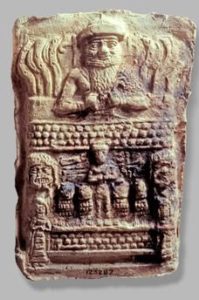 (Martu & the Martu uncivilized earthlings) (far less advanced people living in mountains, “ape-like primitives”, named & controlled by Anu‘s son Martu)
(Martu & the Martu uncivilized earthlings) (far less advanced people living in mountains, “ape-like primitives”, named & controlled by Anu‘s son Martu)
The highland Martu people ignorant of agriculture, brought spirited cattle and kids for her.
The Meluhans, the people of the black land, brought exotic wares
(some mss. have instead: wares of foreign countries) up to her.
Elam and Subir loaded themselves with goods for her as if they were packasses.
All the governors, the temple administrators (1 ms. has instead: generals),
and the accountants of the Gu-edina regularly supplied the monthly and New Year offerings.
What a weariness all these caused at Agade‘s city gates!
Holy Inanna could hardly receive all these offerings.
As if she were a citizen there, she could not restrain (?) the desire (?) to prepare the ground for a temple.
But the statement coming from the E-kur (Enlil‘s ziggurat temple / residence in Nippur) was disquieting.
Because of Enlil (?) all Agade was reduced (?) to trembling, and terror befell Inanna in Ulmac.
She left the city, returning to her home.
Holy Inanna abandoned the sanctuary of Agade like someone abandoning the young women of her woman’s domain.
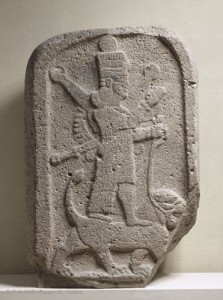 (Inanna, Goddess of War with high-tech alien weaponry used against non-loyal earthlings)
(Inanna, Goddess of War with high-tech alien weaponry used against non-loyal earthlings)
Like a warrior hurrying to arms, she removed (some mss. have instead: tore away) the gift of battle
and fight from the city and handed them over to the enemy.
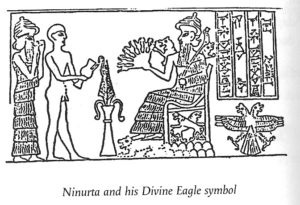 (Ninurta seated, Enlil‘s heir & warrior son)
(Ninurta seated, Enlil‘s heir & warrior son)
Not even five or ten days had passed and Ninurta brought the jewels of ruler ship,
the royal crown, the emblem and the royal throne bestowed on Agade, back into his E-cumeca.
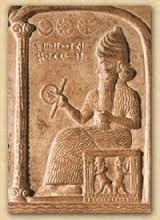 (Utu, grandson to Enlil, son to Nannar, twin to Inanna)
(Utu, grandson to Enlil, son to Nannar, twin to Inanna)
Utu took away the eloquence of the city. Enki took away its wisdom.
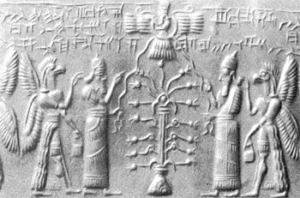 (Anu, King & god the father in Heaven, his sons established Earth Colony)
(Anu, King & god the father in Heaven, his sons established Earth Colony)
An took up (some mss. have instead: out) (1 ms. has instead: away)
into the midst of heaven its fearsomeness that reaches heaven.
 (Inanna, twin to Utu, Goddess of Love & War)
(Inanna, twin to Utu, Goddess of Love & War)
Enki tore out its well-anchored holy mooring pole from the abzu.
Inanna took away its weapons.
The life of Agade‘s sanctuary was brought to an end
as if it had been only the life of a tiny carp in the deep waters, and all the cities were watching it.
Like a mighty elephant, it bent its neck to the ground while they all raised their horns like mighty bulls.
Like a dying dragon, it dragged its head on the earth and they jointly deprived it of honor as in a battle.
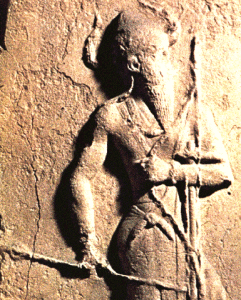 (giant mixed-breed King of Akkad, Narram-Suen, descendant offspring of the gods)
(giant mixed-breed King of Akkad, Narram-Suen, descendant offspring of the gods)
(King) Naram- Suen saw in a nocturnal vision
that Enlil would not let the kingdom of Agade-occupy a pleasant, lasting residence,
that he would make its future altogether unfavorable,
that he would make its temples shake and would scatter its treasures (1 ms. has instead: destroy its treasuries).
He realized what the dream was about, but did not put into words, and did not discuss it with anyone.
(1 ms. adds 2 lines: …… temples shake ……, …… perform (?) extispicy regarding (?) his temple …….)
(E-kur, mud brick-built mountain / residence of Enlil & Ninlil in his patron city of Nippur)
Because of the E-kur, he put on mourning clothes,
covered his chariot with a reed mat (1 ms. has instead: pulled out the outside pin of his chariot),
tore the reed canopy off his ceremonial barge (1 ms. has instead: the prow of his ceremonial barge)
(1 ms. has instead: the cabin of his ceremonial barge), and gave away his royal paraphernalia.
(King) Naram- Suen persisted for seven years!
Who has ever seen a king burying his head in his hands for seven years?
(some mss. add the line: He realized what the dream was about,
but did not put it into words, and did not discuss it with anyone.)
Then he went to perform extispicy on a kid regarding the temple,
but the omen had nothing to say about the building of the temple.
For a second time he went to perform extispicy on a kid regarding the temple,
but the omen again had nothing to say about the building of the temple.
In order to change what had been inflicted (?) upon him, he tried to alter Enlil‘s pronouncement
Because his subjects were dispersed, he now began a mobilization of his troops.
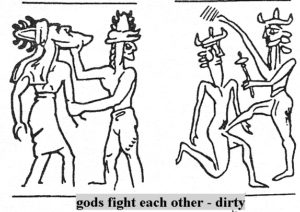
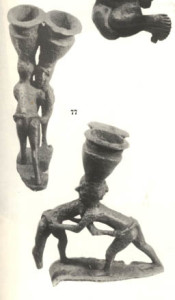 (gods wrestling; earthlings wrestling, 3,000 B.C.)
(gods wrestling; earthlings wrestling, 3,000 B.C.)
Like a wrestler who is about to enter the great courtyard, he …… his hands towards (?) the E-kur.
Like an athlete bent to start a contest, he treated the giguna as if it were worth only thirty shekels.
Like a robber plundering the city, he set tall ladders against the temple.
To demolish E-kur as if it were a huge ship, to break up its soil
like the soil of mountains where precious metals are mined,
to splinter it like the lapis lazuli mountain, to prostrate it, like a city inundated by Ickur (Ishkur / Adad).
Though the (mud brick-built) temple was not a mountain where cedars are felled,
he had large axes cast, he had double-edged agasilig axes sharpened to be used against it.
He set spades against its roots and it sank as low as the foundation of the Land.
He put axes against its top, and the temple, like a dead soldier, bowed its neck before him,
and all the foreign lands bowed their necks before him.
He ripped out its drain pipes, and all the rain went back to the heavens .
He tore off its upper lintel and the Land was deprived of its ornament
(1 ms. has instead: the ornament of the Land disappeared).
From its “Gate from which grain is never diverted”, he diverted grain, and the Land was deprived of grain.
He struck the “Gate of Well-Being” with the pickaxe, and well-being was subverted in all the foreign lands.
As if they were for great tracts of land with wide carp-filled waters,
(E-kur, Enlil‘s temple / residence, image re-creation of Enlil‘s Earth Colony Command Center)
he cast large spades (1 ms. has instead: axes) to be used against the E-kur.
The people could see the bedchamber, its room which knows no daylight.
The Akkadians could look into the holy treasure chest of the gods.
Though they had committed no sacrilege,
its Lahamu deities of the great pilasters standing at the temple were thrown into the fire by Naram- Suen.
The cedar, cypress, juniper and boxwood, the woods of its giguna, were …… by him.
He put its gold in containers and put its silver in leather bags.
He filled the docks with its copper, as if it were a huge transport of grain.
The silversmiths were re-shaping its silver, jewelers were re-shaping its precious stones, smiths were beating its copper.
Large ships were moored at the temple, large ships were moored at Enlil‘s temple
and its possessions were taken away from the city, though they were not the goods of a plundered city.
With the possessions being taken away from the city, good sense left Agade.
As the ships moved away from (some mss. have instead: juddered) the docks,
Agade‘s intelligence (1 ms. has instead: sanctuary) (alien technology) was removed.
 (Enlil, determined to maintain total control on Earth Colony)
(Enlil, determined to maintain total control on Earth Colony)
Enlil, the roaring (?) storm that subjugates the entire land, the rising deluge that cannot be confronted,
was considering what should be destroyed in return for the wrecking of his beloved E-kur.
He lifted his gaze towards the Gubin mountains, and made all the inhabitants of the broad mountain ranges descend (?).
Enlil brought out of the mountains those who do not resemble other people (ape-like),
who are not reckoned as part of the Land, the Gutians (under Martu), an unbridled people,
with human intelligence but canine instincts (some mss. have instead: feelings) and monkeys’ features.
Like small birds they swooped on the ground in great flocks.
Because of Enlil, they stretched their arms out across the plain like a net for animals.
Nothing escaped their clutches, no one left their grasp.
Messengers no longer traveled the highways, the courier’s boat no longer passed along the rivers.
The Gutians drove the trusty (?) goats of Enlil out of their folds and compelled their herdsmen to follow them,
they drove the cows out of their pens and compelled their cowherds to follow them.
Prisoners manned the watch. Brigands occupied (1 ms. has instead: attacked) the highways.
The doors of the city gates of the Land lay dislodged in (1 ms. has instead: were covered with) mud,
and all the foreign lands uttered bitter cries from the walls of their cities.
They established gardens for themselves (1 ms. has instead: made gardens grow) within the cities,
and not as usual on the wide plain outside.
As if it had been before the time when cities were built and founded,
the large (some mss. add: fields and) arable tracts yielded no grain,
the inundated (some mss. add: fields and) tracts yielded no fish, the irrigated orchards yielded no syrup or wine,
the thick clouds (?) did not rain, the macgurum plant did not grow.
In those days, oil for one shekel was only half a liter,
grain for one shekel was only half a liter, wool for one shekel was only one mina,
fish for one shekel filled only one ban measure — these sold at such prices in the markets of the cities!
Those who lay down on the roof, died on the roof; those who lay down in the house were not buried.
People were flailing at themselves from hunger.
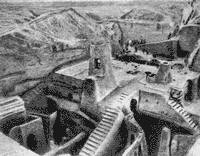 (all mud brick-built by the giants)
(all mud brick-built by the giants)
By the Ki-ur, Enlil‘s great place, dogs were packed together in the silent streets;
if two men walked there they would be devoured by them,
and if three men walked there they would be devoured by them.
Noses were punched (?), heads were smashed (?), noses (?) were piled up, heads were sown like seeds.
Honest people were confounded with traitors, heroes lay dead on top of heroes,
the blood of traitors ran upon the blood of honest men.
At that time, Enlil rebuilt his great sanctuaries into small reed (?)
sanctuaries and from east to west he reduced their storehouses.
The old women who survived those days, the old men who survived those days
and the chief lamentation singer who survived those years set up seven balaj drums,
as if they stood at the horizon, and together with ub ,meze, and lilis
(some mss. have instead: cem, and lilis) (1 ms. has instead: and bronze cem)
drums made them resound to Enlil like Ickur (Ishkur / Adad) for seven days and seven nights.
The old women did not restrain the cry “Alas for my city!”.
The old men did not restrain the cry “Alas for its people!”.
The lamentation singer did not restrain the cry “Alas for the E-kur!”.
Its young women did not restrain from tearing their hair.
Its young men did not restrain from sharpening their knives.
Their laments were as if Enlil‘s ancestors were performing a lament
in the awe-inspiring Holy Mound by the holy knees of Enlil.
Because of this, Enlil entered his holy bedchamber and lay down fasting.
(Enlil Inanna Utu Enki Isumud)
At that time, Suen (Sin / Nannar), Enki, Inanna, Ninurta, Ickur, Utu, Nuska, and Nisaba, the great gods
(1 ms. has instead: all the gods whosoever), cooled (1 ms. has instead: sprinkled)
Enlil‘s heart with cool water and prayed to him:
“Enlil, may the city that destroyed your city, be treated as your city has been treated!
May the one that defiled your giguna, be treated as Nibru (Nippur)!
In this city, may heads fill the wells!
May no one find his acquaintances there, may brother not recognize brother!
May its young woman be cruelly killed in her woman’s domain, may its old man cry in distress for his slain wife!
May its pigeons moan on their window ledges, may its small birds be smitten in their nooks,
may it live in constant anxiety like a timid pigeon!”
Again, Suen, Enki, Inanna, Ninurta, Ickur, Utu, Nuska and Nisaba, all the gods whosoever,
turned their attention to the city, and cursed Agade severely:
“City, you pounced on E-kur: it is as if you had pounced on Enlil!
Agade, you pounced on E-kur: it is as if you had pounced on Enlil!
May your holy walls, to their highest point, resound with mourning!
May your giguna be reduced to a pile of dust!
May your pilasters with the standing Lahamu (Mars) deities (Igigi)
fall to the ground like tall young men drunk on wine!
May your clay be returned to its abzu, may it be clay cursed by Enki!
May your grain be returned to its furrow, may it be grain cursed by Ezinu (Ninlil)!
May your timber be returned to its forest, may it be timber cursed by Ninilduma (gods master carpenter)!
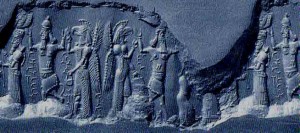 (Ninurta, unidentified, & Apkulla, eagle-headed with wings – pilots)
(Ninurta, unidentified, & Apkulla, eagle-headed with wings – pilots)
May the (1 ms. has instead: your) cattle slaughterer slaughter his wife,
may your (some mss. have instead: the) sheep butcher butcher his child!
May water wash away your pauper as he is looking for ……!
May your prostitute hang herself at the entrance to her brothel!
May your pregnant (?) hierodules and cult prostitutes abort (?) their children!
May your gold be bought for the price of silver, may your silver be bought for the price of pyrite (?),
and may your copper be bought for the price of lead!”
“Agade, may your strong man be deprived of his strength,
so that he will be unable to lift his sack of provisions and ……,
and will not have the joy of controlling your superior asses; may he lie idle all day!
May this make the city die of hunger!
May your citizens, who used to eat fine food, lie hungry in the grass and herbs,
may your …… man eat the coating on his roof, may he chew (?) the leather hinges on the main door of his father’s house!
May depression descend upon your palace, built for joy (1 ms. has instead: joyous palace)!
May the evils of the desert, the silent place, howl continuously!”
“May foxes that frequent ruin mounds brush with their tails your fattening-pens (?), established for purification ceremonies!
May the ukuku, the bird of depression, make its nest in your gateways, established for the Land!
In your city that could not sleep because of the tigi drums, that could not rest from its joy,
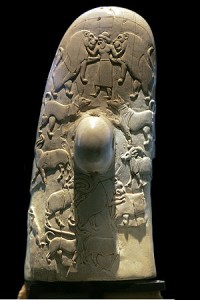
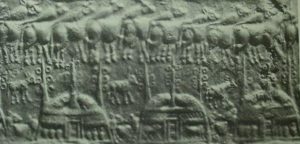 (Nannar protects his Cattle Pens in Ur)
(Nannar protects his Cattle Pens in Ur)
may the bulls of Nanna (Nannar / Sin) that fill the pens bellow like those who wander in the desert, the silent place!
May the grass grow long on your canal-bank tow-paths,
may the grass of mourning grow on your highways laid for wagons!
Moreover, may …… wild rams (?) and alert snakes of the mountains
allow no one to pass on your tow-paths built up with canal sediment!
In your plains where fine grass grows, may the reed of lamentation grow!
Agade, may brackish water flow (1 ms. has instead:
May brackish water flow in the river), where fresh water flowed for you!
If someone decides, “I will dwell in this city!”, may he not enjoy the pleasures of a dwelling place!
If someone decides, “I will rest in Agade!”, may he not enjoy the pleasures of a resting place!”
 (Utu, son to Nannar, Commander of the Space Ports)
(Utu, son to Nannar, Commander of the Space Ports)
And before Utu (Shamash) on that very day, so it was!
On its canal bank tow-paths, the grass grew long.
On its highways laid for wagons, the grass of mourning grew.
Moreover, on its tow-paths built up with canal sediment,
…… wild rams (?) and alert snakes of the mountains allowed no one to pass.
On its plains, where fine grass grew, now the reeds of lamentation grew.
Agade‘s flowing fresh water flowed as brackish water.
When someone decided, “I will dwell in that city!”, he could not enjoy the pleasures of a dwelling place.
When someone decided, “I will rest in Agade!”, he could not enjoy the pleasures of a resting place
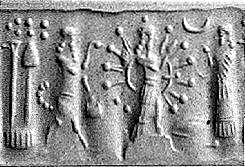 (Inanna with advanced alien technologies)
(Inanna with advanced alien technologies)
Inana be praised for the destruction of Agade!
Fragments of an earlier version from Nippur, dating to the Third Dynasty of Ur
Segment A
unknown number of lines missing
Enki took away its wisdom.
An took up into the midst of heaven its fearsomeness that reaches heaven.
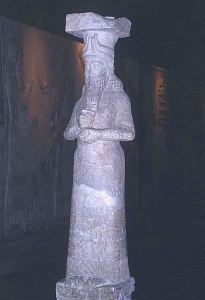 (Enki, thousands of Mesopotamian artifacts are now shamefully destroyed by Radical Islam)
(Enki, thousands of Mesopotamian artifacts are now shamefully destroyed by Radical Islam)
Enki tore out its well-anchored holy mooring pole from the Abzu.
unknown number of lines missing
Segment B
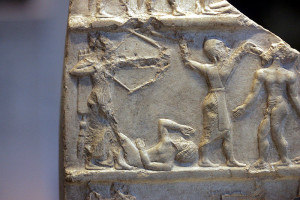 (victory stele of Narram-Suen)
(victory stele of Narram-Suen)
Naram- Suen saw in a nocturnal vision that he would make its future altogether unfavorable,
that he would make its temples shake and would scatter its treasures!
unknown number of lines missing
Segment C
as if he were to change what had been inflicted (?) upon him.
His subjects were dispersed, so he began a mobilization of his troops.
Like a wrestler who is about to enter the great courtyard, he …… his hands towards (?) the E-kur.
Like an athlete bent to start a contest, he treated the giguna as if it were worth only thirty shekels.
Like a robber plundering the city, he set tall ladders against the temple.
Though the temple was not a mountain of cedars, he had large axes cast to be used against it. (1 ms. adds the line:
He had double-edged agasilig axes sharpened to be used against it.)
As if they were for great tracts of land with huge (1 ms. has instead: wide) carp-filled waters,
he cast large spades (1 ms. has instead: …… to be used against the E-kur).
He put spades against its roots.
unknown number of lines missing
Segment D
and the Land was deprived of grain.
He struck the “Gate of Well-Being” with pickaxe and well-being was destroyed in all the foreign lands
unknown number of lines missing
Segment E
4 lines unclear
unknown number of lines missing
Segment F
Noses were punched, heads were smashed (?), noses (?) were piled up, heads were sown like seeds.
Heroes lay (?) dead on top of heroes, the blood of traitors ran (?) upon honest men.
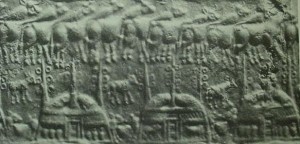 (ancient reed housing)
(ancient reed housing)
Enlil rebuilt his great sanctuaries into small reed (?) sanctuaries and from the south to the uplands …….
Etana and the Goddess (Re-telling) The Etana Myth Explained
One of the many sources for Etana: Dalley, Stephanie (1989)
Myths from Mesopotamia: Creation, the Flood, Gilgamesh and others.
Oxford, Oxford University Press.
The Evening Star (Venus / Inanna) appeared gloriously in the skies, and soon the navy velvet of the night was going to fall. It was then that Etana spotted in the horizon the last Gate of his Ascent Journey this time, the Gate of Ishtar. Heart pounding with anticipation, he braced himself for the eagle’s landing. In front of him, the elegant lapis lazuli walls carved with golden lions and rosettes were a sight to behold. In Babylon, the Gate of the Gods,
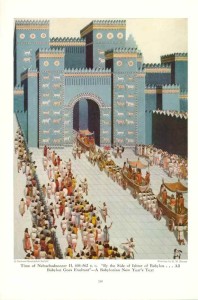 (private entrance Gate of Ishtar / Inanna into Babylon, Marduk‘s patron city)
(private entrance Gate of Ishtar / Inanna into Babylon, Marduk‘s patron city)
it was the Gate of Ishtar that led the processional way to the holy precinct of the Great Gods. So it was in the Everlasting Babylon of the Soul.
(Texts: All Artifacts, Color Coding, & Writings in Bold Type With Italics Inside Parenthesis, are Added by Editor R. Brown, not the Authors, Translators, or Publishers!)
(gods in blue …mixed-breed demigods in teal…)
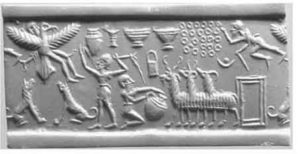
(Etana carried in flight to heaven / planet Nibiru, by eagles / alien pilots)
“I thank you for the ride, my friend’, he said to the eagle (pilot)
patting the neck of his feathered friend as he got off his back.
‘I have an important request: would you be so kind to wait for me here?
I feel I need to go through these gates on my own.’
‘Even if I wanted, friend and king, my entrance would be barred… ‘,
whispered the eagle, and if Etana were not so anxious to proceed,
he would most certainly have stopped to ask what his friend meant by that cryptic statement.
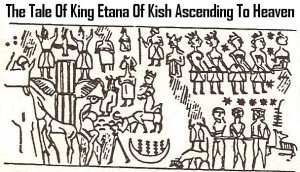 (Kish tale of King Etana lifting off Earth by eagle for planet Nibiru)
(Kish tale of King Etana lifting off Earth by eagle for planet Nibiru)
The king of Kish took a deep breath to center himself and stepped through the Gate,
and the familiar clouds involved him to lead him to the Inner Realms.
He allowed himself a couple of minutes to adjust and then proceeded forwards.
Soon the clouds dissipated and he saw himself in a large well-lit room
whose glassed windows (5,000 years ago!) let in the magic of sunset hour, the rainbow colors of the changing skies.
The room was long, a hall fit for kings, and upon a dais he saw Her (Inanna).
His heart knew who She was, and so he proceeded.
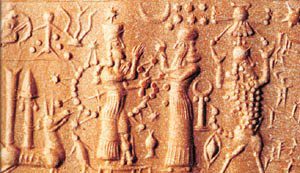
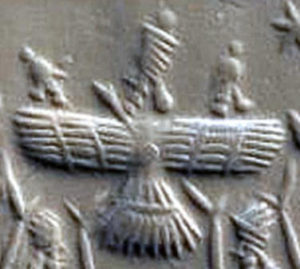 (Inanna & grandfather Lord Air Enlil; Commander Enlil, King Anu, & Enki above in alien sky-disc)
(Inanna & grandfather Lord Air Enlil; Commander Enlil, King Anu, & Enki above in alien sky-disc)
How long had it been since She, the Great Goddess of Love and War (Inanna),
and Enlil, Lord Air and the most important of the younger generation of the Anunnaki gods,
had come to earth, in search of a king to rule the land?
He, Etana, had been their choice.
Now, after all these years, Etana wondered whether
They had made the right choice.
And this realization was killing him deep inside.
No matter what, he proceeded to kneel and bow to the ground respectfully in front of Her.
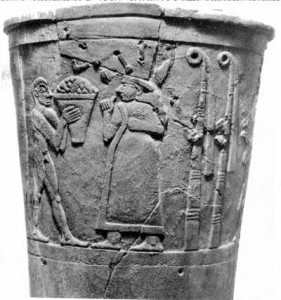 (fair-haired Inanna served by early “modern man”, fashioned from their image & likeness)
(fair-haired Inanna served by early “modern man”, fashioned from their image & likeness)
His eyes dared to face Her (Inanna) adoringly.
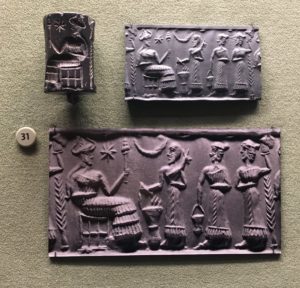 (highlighted long hair of Inanna, desired by all, gods & mixed-breeds)
(highlighted long hair of Inanna, desired by all, gods & mixed-breeds)
Youthful, tall, long dark hair that showed glints of gold in the sunset hour,
She wore a fringed dress of a soft color and fabric he would not be able to name.

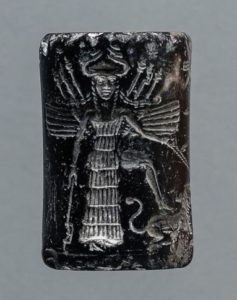 (Inanna, Goddess of Love & War)
(Inanna, Goddess of Love & War)
The garment was a bit lower than knee length, golden leather sandals and a crown of flowers was upon her forehead.
As long ago, She had come to him as the Divine Huntress, the Warrior, the spirit of love and adventure.
(giant alien Anunnaki goddesses stand before Inanna seated over her battle lions; lion under Inanna‘s dais, her zodiac sign Leo)
Lions slept under the dais of Her throne.
They looked like contented cats and not ferocious beasts.
He remembered Her so well, and She had not changed at all.
‘Lady of my Heart, Champion of my soul, I lend you graces’, he greeted, ignoring the lions and concentrating on Her.
‘It has been a long time, King of Kish‘, She replied.
He breathed hard.
‘Perhaps too long… now I know this for sure’.
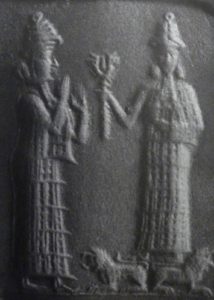 (giant goddesses Ninsun & Inanna with much smaller lions at her feet, & alien technology in hand)
(giant goddesses Ninsun & Inanna with much smaller lions at her feet, & alien technology in hand)
She rose to her feet, the lions did not stir, and to his utter amazement,
She moved towards the large window on the Western Quarter and sat graciously on the window sill,
(Inanna in the window, original to later epics of the “woman in the window”, “woman in wait”, etc.)
Her back to the twilit skies.
She made space for him to take a seat by Her side, but he declined and sat on the floor.
Etana swallowed hard and started in one go, choosing carefully his words to address Her in the first place:
‘So much has happened so far, Great Lady, and I sincerely am not quite sure,
but somehow I feel I have reached a turning point which is recharging me and eventually will bring me success.
As if I were finally sort of discerning the light at the end of the tunnel, although it is just a hope.
It is associated with a turning of darkness back towards the direction of the light, the winter solstice,
the shortest day of the year, the day when darkness begins to decrease and the hours of daylight increase.
It is the beginning of a turn-around; a time of letting go of the old and making way for the new;
a time of new beginnings, and it starts with rest.’
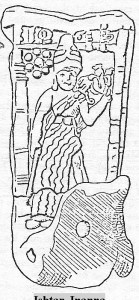
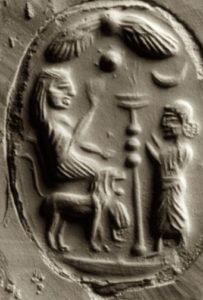 (young giant Inanna / Ishtar, Goddess of Love & War with lion, & king)
(young giant Inanna / Ishtar, Goddess of Love & War with lion, & king)
‘Nice rhetorics, but wouldn’t you like to go straight to the point?’, asked the Goddess, direct and frank as usual.
‘It has been a long and difficult journey for you since we last met.
And I can give you some clues for what has happened to you so far.
Would you like that?’
Etana sighed, but appreciated Her way of dealing with his awkwardness:
‘I need to clarify many, many things with you, my Lady.
Oh, I know well about being an initiate, your initiate.
It means the never-ending breaking out of old patterns, of everything that needs to be changed
so that a solid foundation can be established for living in all worlds.
This is exactly what happened to me so far… I just wish I had realized all this before!’
‘Can you elaborate more?’
‘Sure, I can.
I was meditating hard about what has happened to me so far since we first met,
(semi-divine, Inanna, & Enlil, alien gods chose the 1st monarchs of their city-states, their offspring)
when you and lord Enlil chose me to be the first monarch of the land.
I came to some conclusions.
The trials of being a king and shepherd, the first ruler of the land.
No, better still, the trials of deserving my crown and as such becoming the (giant semi-divine mixed-breed)
living link between the people of the land and the gods,
You in special.
The difficulty of understanding and applying the discipline of power and empowerment,
to protect the weak and yet not to lose sight of the greedy and troublemakers
to attempt to get them back into the fold.
This was the meaning of the eagle and the snake, (Myth of Etana) wasn’t it?
A metaphor for me to understand the meaning of power and the exercise of justice
between irreconcilable oppositions within a nation that was being built?’
‘How so?’ She asked, her voice a quiet command.
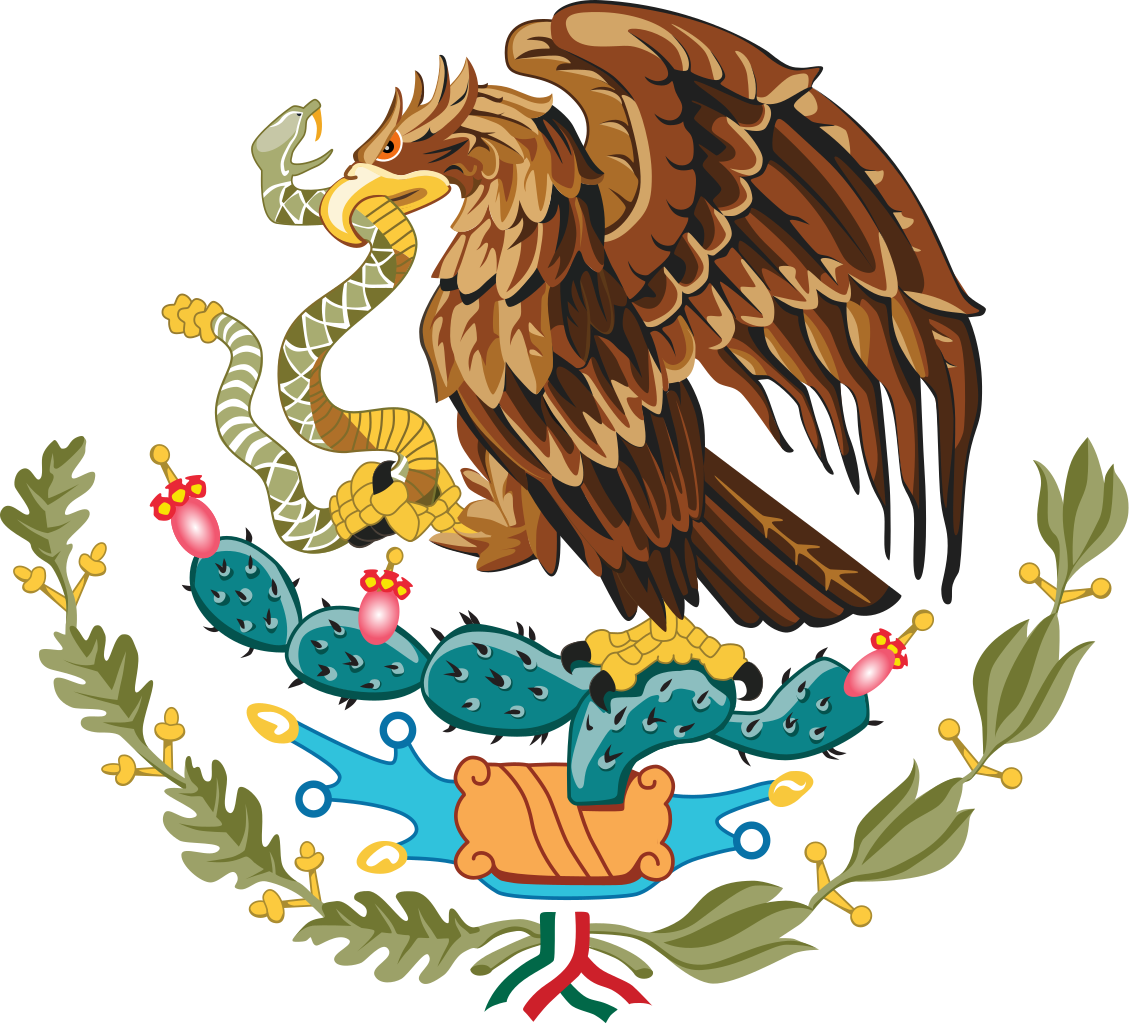
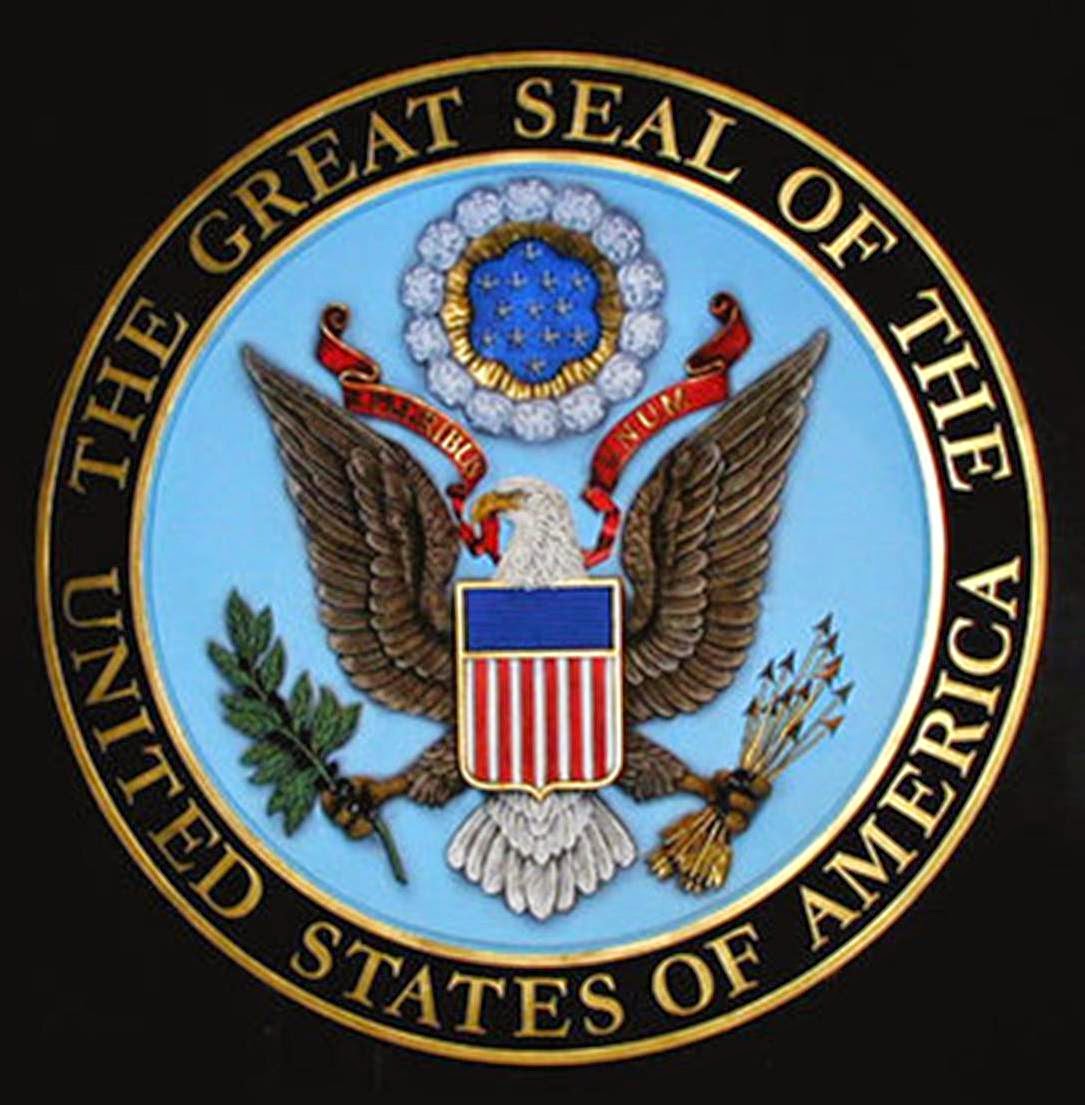
(Mexican Coat of Arms; United States Great Seal, & on & on.)
‘The eagle and the snake can be seen as the warring factions of the land a monarch should keep close watch upon.
Difficult to unite, for they are different species,
although a truce can be established and maintained by the application of justice.
However, the greedy eagle is the one that poses the hardest trial for the king.
By betraying the snake and killing its offspring it needed more healing and more atonement.
And I meditated a great deal why I had to face all trials with the eagle, the traitor,
instead of lining up with the grieving snake.’
Tears started flowing copiously, but Etana continued relentlessly:
‘I was the snake myself, grieving for the offspring of my blood I so badly wanted to father.
The snake was the animal in me, raw energy and grief.
But I am also the king, responsible for peace, wealth, progress and health.
I could not leave the treacherous eagle to his devices,
I had to rescue him back, heal it and make it ascend with me to finally face you in the end.
Hit and crash approach this one of yours, isn’t it?’
Suddenly he also understood the eagle’s indecision to be accepted by the Goddess’ Gate.
The eagle might not be allowed to proceed through, because it had killed the offspring of his friend!
The goddess smiled: ‘But you never gave up and continued towards the ascent.
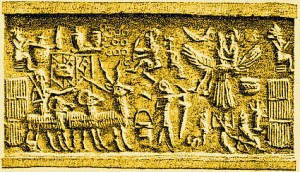 (Etana taken aloft by eagle / pilot heading for their planet Nibiru)
(Etana taken aloft by eagle / pilot heading for their planet Nibiru)
Even when you fell off the back of the eagle three times, somehow you kept going.
One unworthy flight after another?’
Her words hurt, but somehow he felt She was clearly teasing him now, and Etana relaxed a bit.
‘I had to.’
‘Why?’
‘Because You trusted me, and even if I had failed, it was my duty to come to you and say so. Personally.’
(Inanna, goddess-spouse to many semi-divine kings, & so dubbed the “Goddess of Love“)
He was about to tell Her how sorry he was for not having been able to give Her an heir of his blood,
when She seemed to change totally the subject.
‘A question for you, my king: what do you live for?’
Somehow he had expected that question all along, but not at this very moment.
The answer though came from the bottom of his mind, body, heart and soul.
‘To transcend. To learn and experience to make things be in all worlds,
even myself for as many times as it takes and REAL FAST with your help!
I live to deny all denials and to affirm all affirmations in a celebration of the sacredness of matter
so that my soul can fly unbound and free in all worlds I dare to fare.
And most of all, I live to experience the Underworld Descent of Existence in this Flesh as a Conscious Pursuit of Passion,
Joy and Magic to finally return in Wisdom and Love to the Source and Shaper of All’.
‘How far have you lived this truth in the last couple of years?’
Surprise and understanding gripped him hard.
How long had he grieved for a kingdom of the future,
while he had to rule the land in present time to the best of his ideas and ideals,
![]()
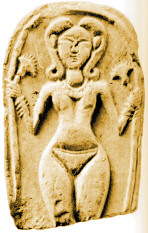 (Inanna, espoused many mixed-breeds appointed to kingships, go-betweens for the gods & earthlings)
(Inanna, espoused many mixed-breeds appointed to kingships, go-betweens for the gods & earthlings)
how much time he had lost trying to breed his offspring
when he had not been ready to understand what it was to be a real father?
Father of the land, empowerer of the spirit of this people came first, were his duties he had not been able to see.
‘I have another question for you, my king,’
Her voice sounded deep and soft, and in the distance he heard a bell striking.
‘What is my Name?’
His breath caught for a second.
She was asking and giving at the same time the Key to HerSelf, the key he had kept hidden for so long within his very Self.
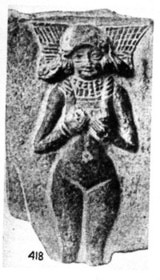 (Ishtar / Inanna artifact, many times over Inanna with many names, was depicted nude as the Goddess of Love)
(Ishtar / Inanna artifact, many times over Inanna with many names, was depicted nude as the Goddess of Love)
‘Inanna, Ishtar, Astarte, many are your names.
But I know You as the Eternal Moment in Me, my Soul Counterpart, Lover and Beloved as One,
the True Vision of Triumphant Joy and Humanity that Overcomes Death and makes You the Greatest of all Goddesses.
You are the answer to all my whys, World Soul I reflect on my own’.
She was smiling now and then Her face changed to reveal the faces of every single person
and being he had loved in his life, past, present and perhaps to come.
The last transformation was totally unexpected, because he saw his own face transfigured by joy,
younger and older images of himself in the most special moments of his life past and perhaps to come.
Then She was Inanna again.
‘You are really so slow sometimes to understand the basics, Beloved King.
Tell me, Etana, all the way when you were trying so hard to reach me and not being able to, how did you feel like?’
Her laughter was like the power of dawn ensouling the land for a brand new day.
Again, he braced himself for what was coming next.
‘I felt like a Fool’.. he blurted.
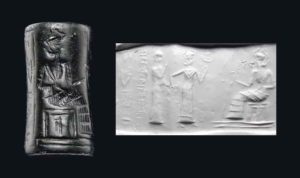 (semi-divine king, goddess spouse Inanna, & Enki; Inanna holds the hand of semi-divine her mixed-breed spouse-king)
(semi-divine king, goddess spouse Inanna, & Enki; Inanna holds the hand of semi-divine her mixed-breed spouse-king)
She stretched Her hands to hold his: ‘And do you think you would have come to Me otherwise?”
